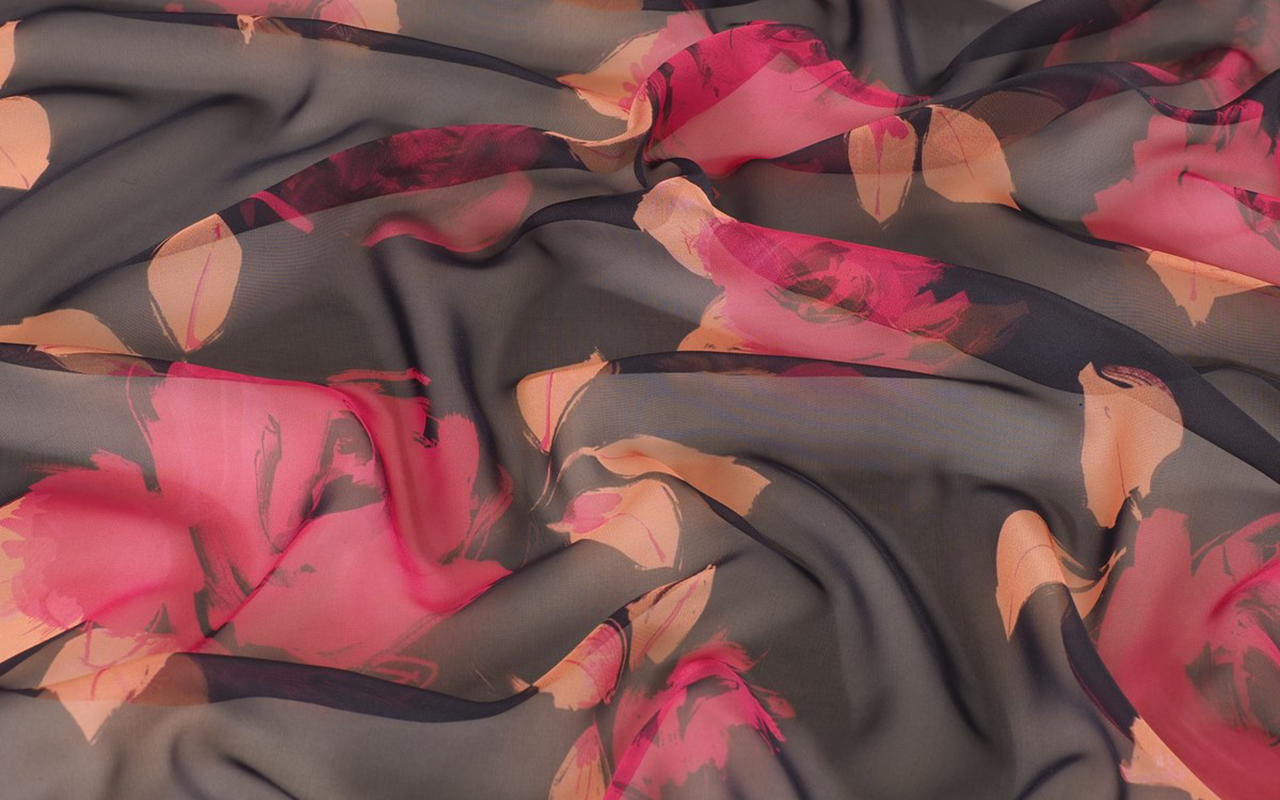(Español) Twiggy aterriza en Barcelona y mucho más en el Moritz Feed Dog 2025
Welcoming the new SS25 collection

At Gratacós, creativity and innovation are part of our essence. As creators and suppliers of fabrics for the major fashion houses, international brands and designers, our mission in each collection is to anticipate trends and offer items that define the future of fashion through the senses. Fabrics that are eye-catching, but also seductive to the touch.
Every year, we present our collections at the world’s leading textile fairs, such as Première Vision (New York and Paris) and Milano Unica (Milan). These events allow us to share our proposals with international designers and brands, as well as to obtain valuable feedback to continue adapting to a constantly evolving market.
So in February, we exclusively unveiled our Spring-Summer 2026 collection, a preview of the trends that will mark the coming seasons. But now, it’s time to dive into the SS25 Collection, the current one that we sell on our website and in our space in Barcelona.
An ode to creativity, freshness and lightness
In general terms, the SS25 collection is born from the need to explore the naive and the pure, connecting us with our most spontaneous essence. From tenderness, freshness and sweetness, the new season transports us to a universe of lightness, where fashion becomes a refuge of kind and optimistic sensations.
This collection is designed for simple, yet sophisticated, effortless and versatile fashion, perfect for those seeking elegance without sacrificing comfort. Through innovative fabrics and high-quality finishes, the new proposal creates ethereal garments that celebrate the arrival of summer.
Colour
Colour is a fundamental pillar of the season. Beyond the neutrals, always elegant and combinable, the collection explores a palette of soft and delicate tones, from the most ethereal pastels to vibrant shades inspired by sugared flowers.
The shades evoke purity and freshness, with nuances reminiscent of sunny days, clear skies and natural light. A play of colours that allows for the creation of elegant and versatile combinations for the summer season.
Textures and reliefs
Gratacós fabrics stand out for their innovation and richness in textures. In this collection, jacquards provide depth and sophistication, while embroidery adds a touch of fantasy to next spring-summer fashion.
Prints will be the main feature, with designs carefully crafted to offer a balance between modernity and timelessness. Each fabric is designed to be transformed into unique garments, ready to come to life in the hands of the most demanding designers.
SS25 not only marks a new era in summer fashion, but also reaffirms Gratacós’ commitment to innovation, creativity and textile excellence. An invitation to dream, create and reinvent summer fashion. We invite you to discover it!
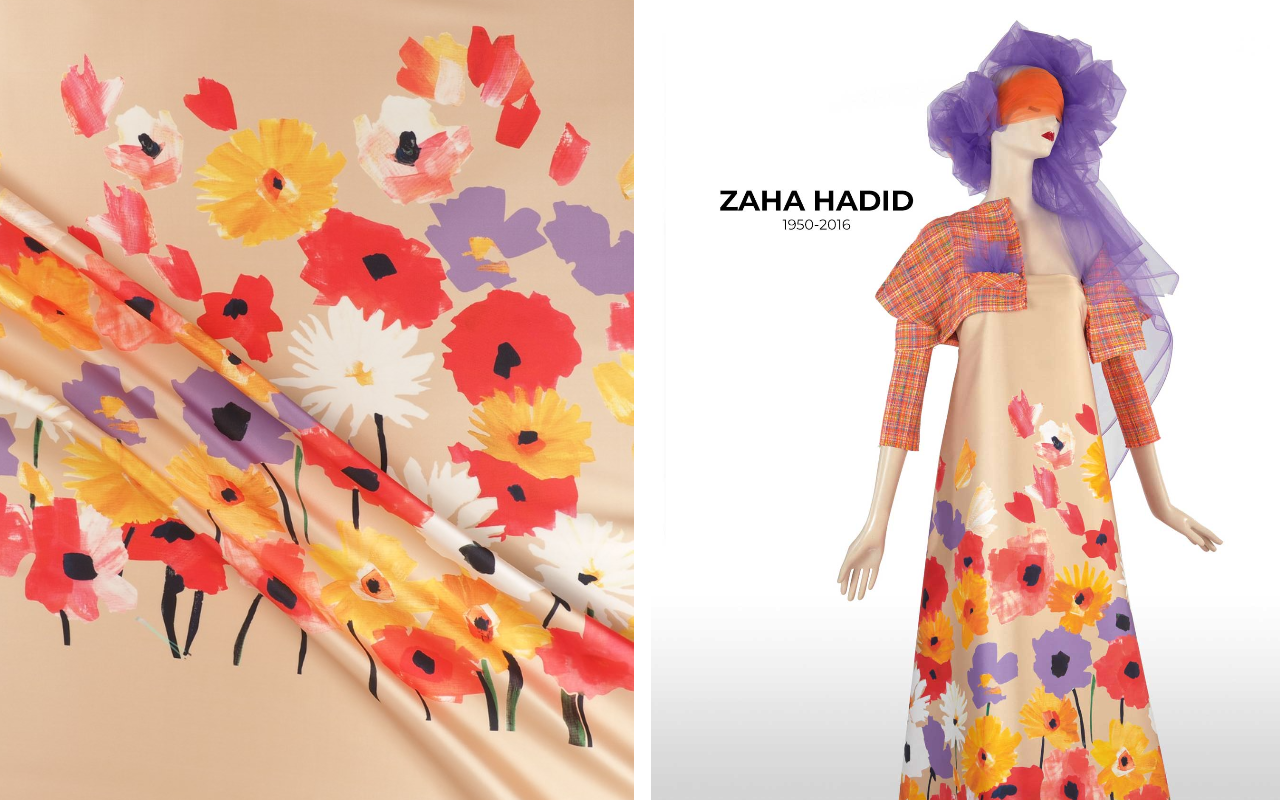
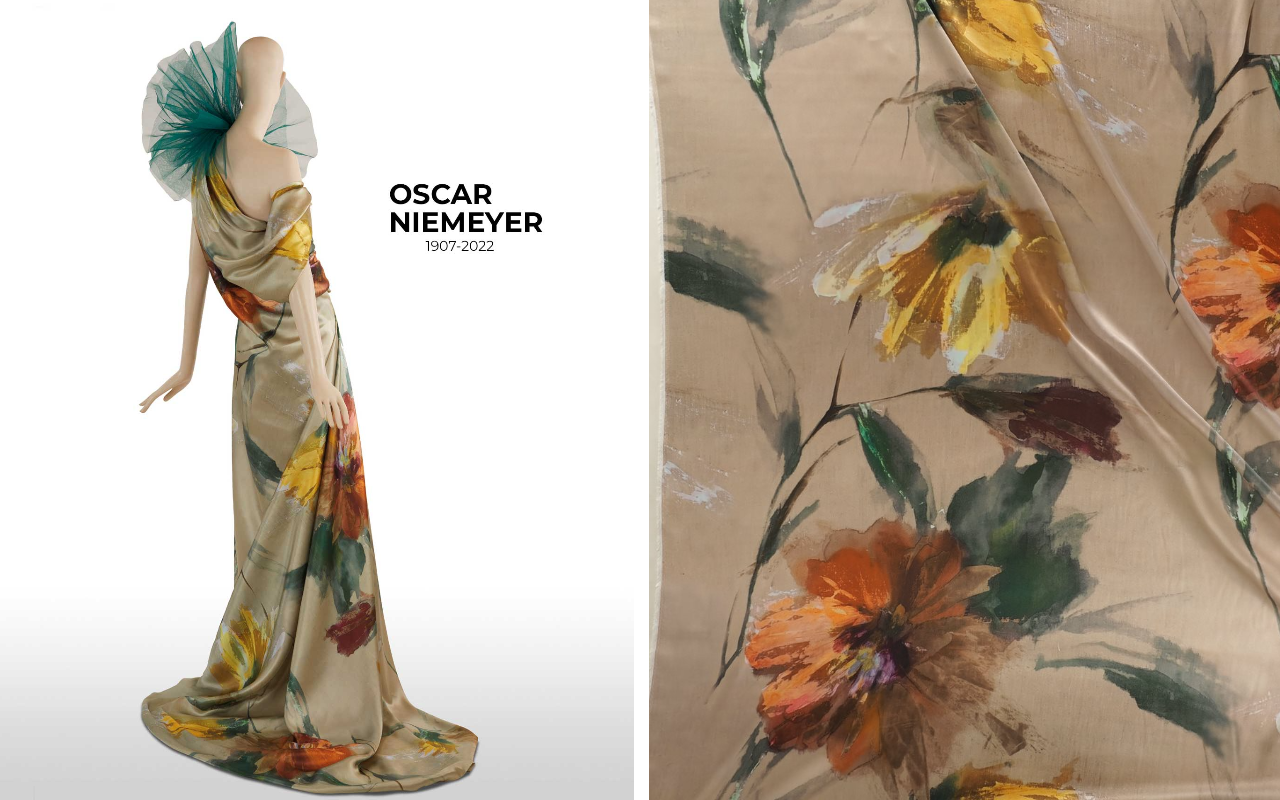
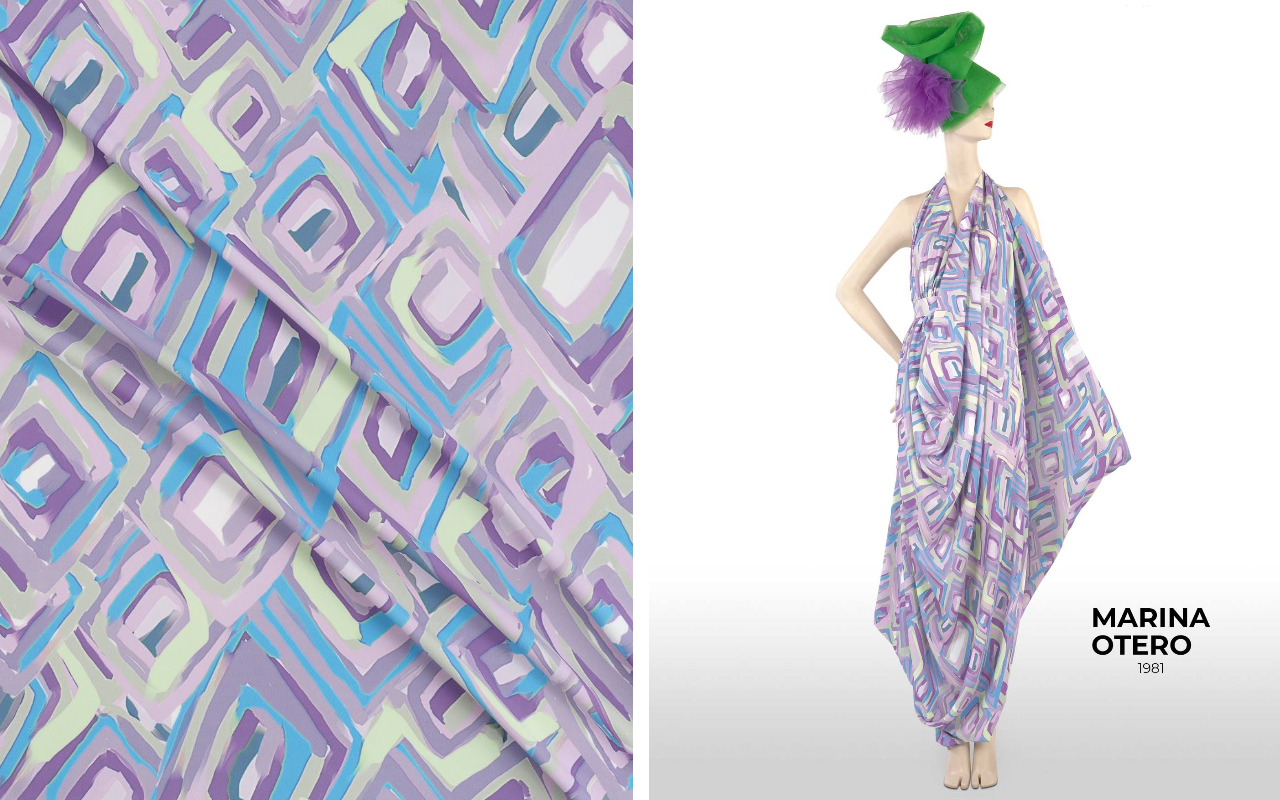
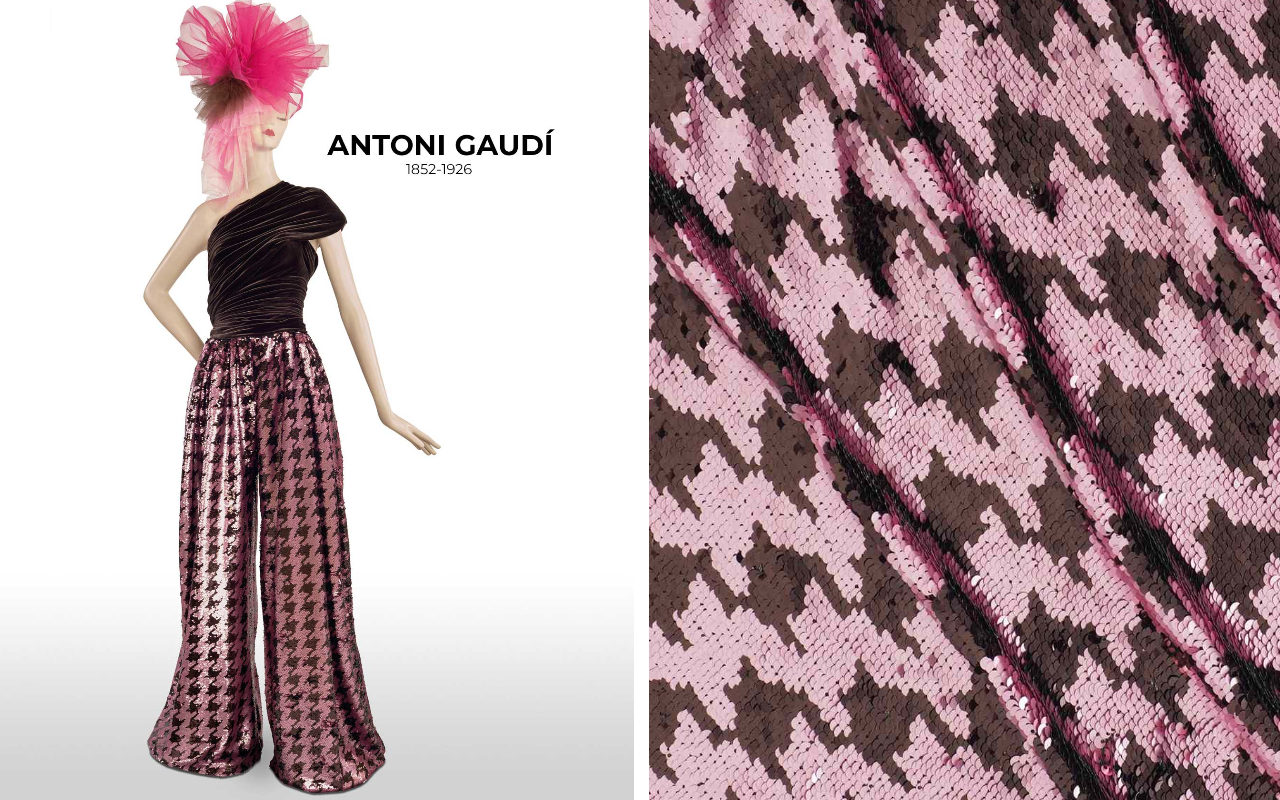
(Español) Diseños inspiradores de la Mercedes-Benz Fashion Week Madrid. Colecciones AW25/26
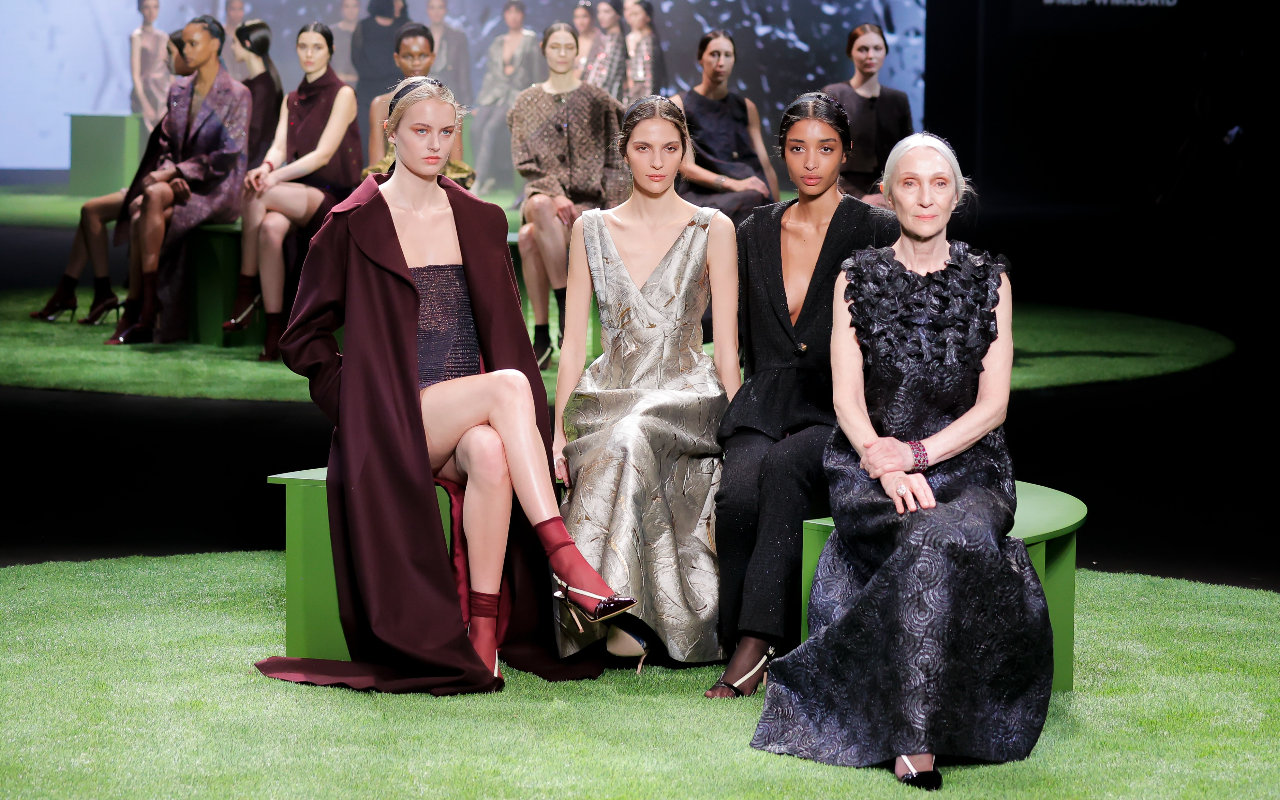 Fely Campo. Mercedes-Benz Fashion Week Madrid. Fall/Winter 2025/2026 Collection
Fely Campo. Mercedes-Benz Fashion Week Madrid. Fall/Winter 2025/2026 Collection
At Gratacós, we closely follow the main Spanish fashion catwalks, always looking to discover how our fabrics become unique pieces full of creativity. We are fascinated to see the transformation of our fabrics in the hands of designers, who manage to give life to collections full of personality and their own style. This connection between raw material and inspiration is, without a doubt, what motivates us the most to continue betting on innovation and quality.
During the recent edition of Mercedes-Benz Fashion Week Madrid, held in February 2025, we had the opportunity to once again see the trust that many designers place in our fabrics for their designs. Female empowerment, sustainability, experimentation with textures and the commitment to materials that combine tradition and technology have been some of the key themes of this season, where each garment not only stands out for its aesthetics, but also for the story behind it.
Below, we present a selection of the most outstanding shows of the Fall- Winter 2025/2026 season, where our fabrics have been the protagonists. It is a privilege to see how each designer explores new forms of expression and plays with textures to propose trends that inspire.
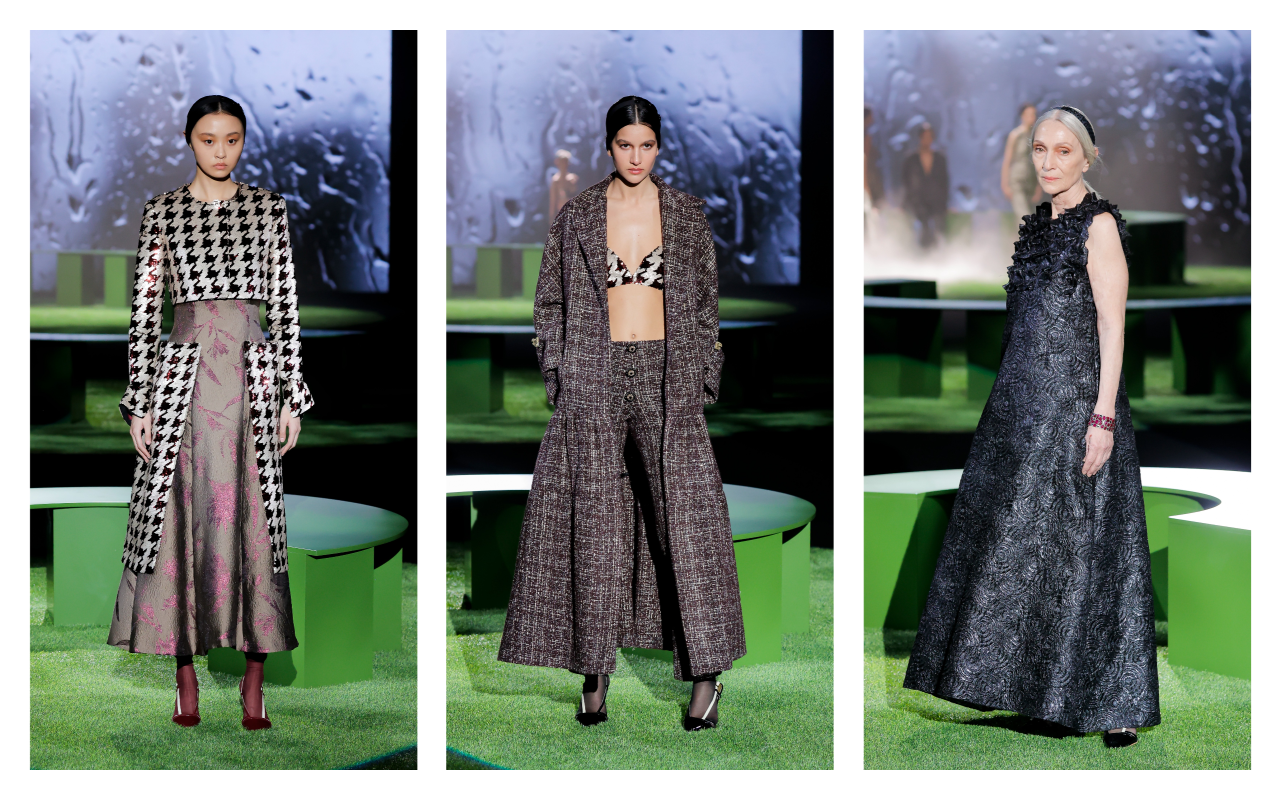 Fely Campo. Mercedes-Benz Fashion Week Madrid. Fall/Winter 2025/2026 Collection
Fely Campo. Mercedes-Benz Fashion Week Madrid. Fall/Winter 2025/2026 Collection
Fely Campo
Fely Campo has presented SELF><WORLD , a collection that invites us to reflect on the relationship between our identity and our environment. What do we project to the world? How is our inner self translated into the image we show? With these questions as a starting point, the designer from Salamanca proposes luxury ready-to-wear where personal essence and external expression merge into the same language.
The autumn-winter 2025/26 collection stands out for its balance between structure and fluidity, playing with materials that evoke emotions and awaken the senses. Tweed, with its enveloping texture, brings warmth and recalls tradition, while velvet is presented as a tribute to sensorial richness, combined with sequins and embroidery that suggest restrained shine and sophistication. Silk, light and ethereal, slides between the pieces, providing movement and softness, in contrast with heavier fabrics such as wool, creating a visual dialogue between the robust and the delicate.
The colour palette breaks free from conventions, breaking the traditional boundaries of colour. Deep tones intertwine with bright flashes, reflecting the multiple facets of the ” self ” and the diversity of emotional states. The versatility of the garments allows each woman to express herself in her own way, with designs intended for everyday use that do not renounce elegance or timelessness.
True to its commitment to sustainability, Fely Campo is committed to pieces that transcend the ephemeral. Each design is conceived to last, resisting the urgency of the new and embracing the beauty that endures over time. The refined and comfortable silhouettes enhance the female figure without imposing themselves, leaving room for the personality of the wearer to be the true protagonist. SELF><WORLD is an invitation to recognize and show oneself as one is, with garments that accompany, envelop and reflect the authenticity of each woman. Because, as the designer herself says, “beauty is in the eyes of the beholder.”
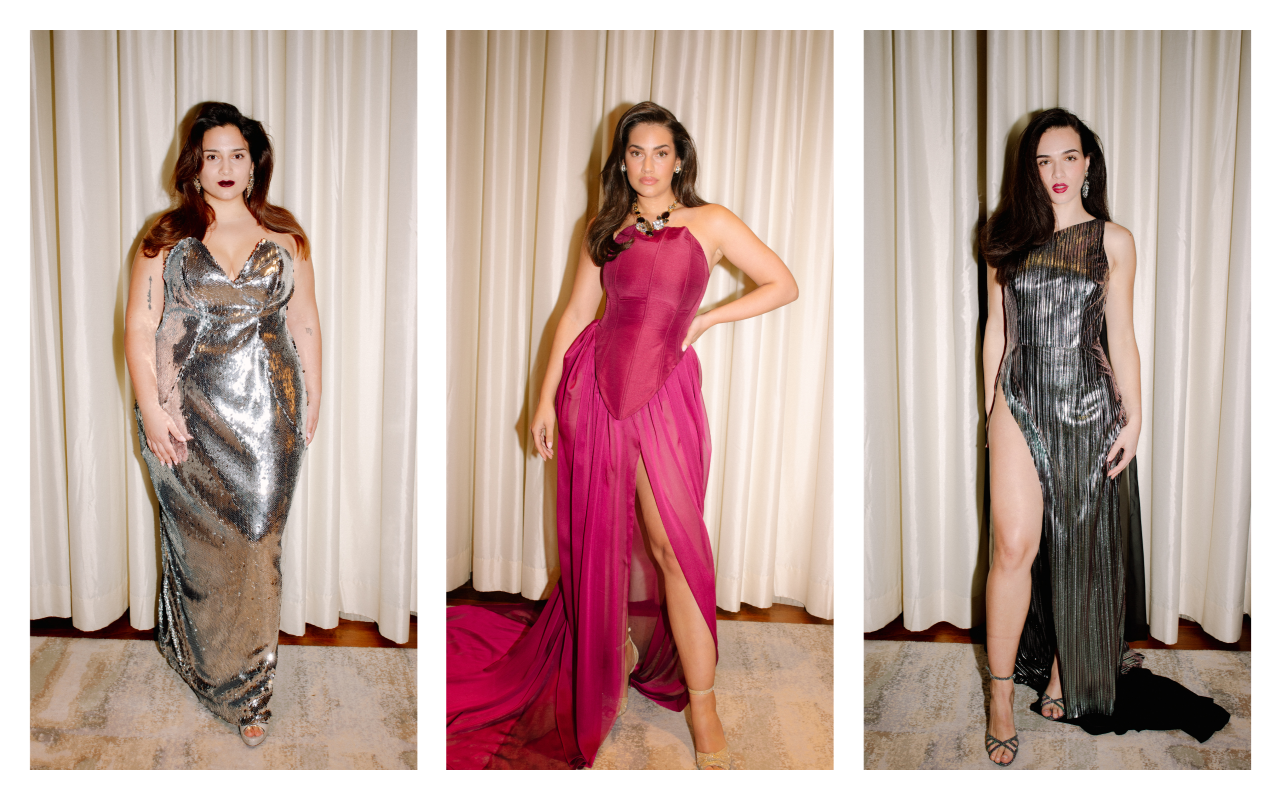
Johanna Calderon
Johanna Calderón chose the emblematic Four Seasons in Madrid to celebrate a fashion show that represents a hymn to body diversity. Each design by the Madrid native with an Andalusian heart is a declaration of self-love, an exaltation of feminine strength and sensuality. Sequins, rhinestones and transparencies took over the catwalk, drawing silhouettes that embrace the body with strategic cuts that enhance the figure without losing elegance. Her collection immerses itself in a festive universe where each garment celebrates self-affirmation. Subtle transparencies coexist with meticulous embroidery and fabrics that shine with their own light, conceived for women who want to feel powerful and radiant. More than fashion, it is a hymn to security and empowerment, with pieces that invite you to dress with confidence and freedom.
To bring this proposal to life, Calderón collaborated with Miah Management , the first Spanish agency dedicated entirely to curvy models. “I was not able to find such a diverse cast of models in any other agency,” explains the designer, a staunch defender of the real representation of women. Diversity was thus one of the central themes of the show, with sizes ranging from 38 to 56, vindicating beauty in all its forms. In short, Johanna Calderón transforms the act of dressing into an experience full of meaning, where sensuality and diversity intertwine to pay tribute to the modern woman: strong, confident and in control of her own story.
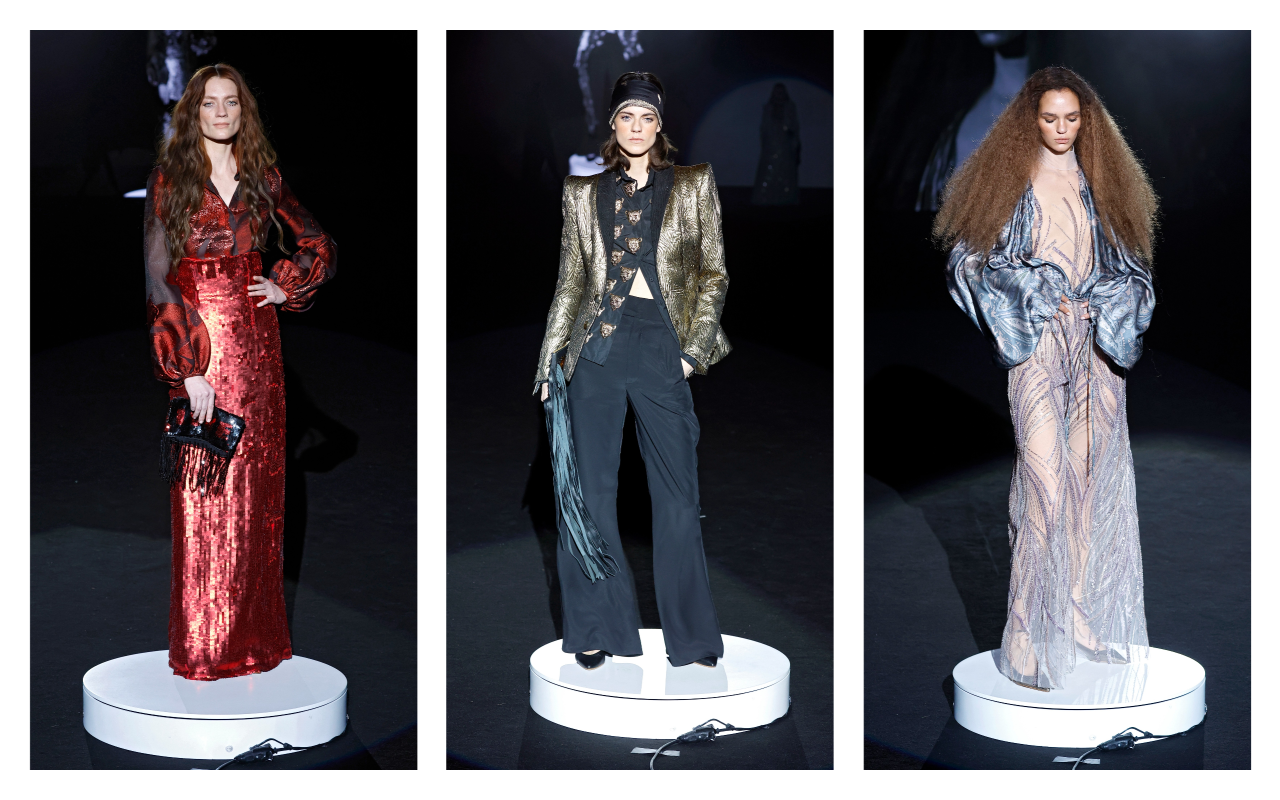 Malne. Mercedes-Benz Fashion Week Madrid. Fall/Winter 2025/2026 Collection
Malne. Mercedes-Benz Fashion Week Madrid. Fall/Winter 2025/2026 Collection
Malne
In “Bohemian Future” Malne has celebrated romantic glamour and the bohemian essence under a futuristic gaze. The firm, founded in 2016 by Paloma Álvarez and Juanjo Mánez, once again opts for slow fashion and artisanal production from its atelier in Madrid, reaffirming its commitment to sustainability and the creation of timeless pieces. With a narrative that fuses the boho chic aesthetic of the 70s with an urban and contemporary approach, the collection dresses a woman who plays with fashion without losing sight of environmental responsibility.
The key garments explore the duality between delicacy and structure: impeccably cut tweed layers are combined with fluid tunics and vaporous blouses that glide over the catwalk. The chiffon dresses, voluptuous and light, are dyed in intense colours such as emerald green, ruby red and classic black, the firm’s fetish tone. Jackets, another of Malne’s distinctive features, are presented in a fitted version, enhancing the feminine silhouette with a sophisticated and urban touch.
As for the materials, the collection for next winter is based on noble fabrics such as tweed, silk chiffon, cashmere, gazar and micropaillettes, which provide texture and subtle shine to the compositions. Each piece is designed to transmit strength and personality, reflecting the DNA of the firm and its focus on fashion as a form of artistic expression. “This collection speaks of a woman of the future, conscious and free, who does not give up luxury or the beauty of what is well done,” comment Álvarez and Mánez.
With this proposal, Malne not only reinterprets bohemian luxe, but reaffirms its place in the Spanish fashion scene as a benchmark for contemporary haute couture, where craftsmanship, sustainability and exclusivity go hand in hand to create unique and timeless garments.
 Mans. Mercedes-Benz Fashion Week Madrid. Fall/Winter 2025/2026 Collection
Mans. Mercedes-Benz Fashion Week Madrid. Fall/Winter 2025/2026 Collection
Mans
The Mans collection, winner of the L’Oréal award for the best collection at the 81st edition of Mercedes-Benz Fashion Week Madrid, delves into the reinterpretation of the feminine suit with impeccable tailoring that balances tradition and innovation. Led by Seville designer Javier Álvarez, the proposal stands out for its careful construction and attention to detail, exploring structured silhouettes with straight lines and fluid volumes that adapt to the female figure, responding to the demands of comfort and contemporary elegance.
Key pieces include British-style suits with double-breasted jackets and large lapels, combined with high-waisted, wide-leg trousers, fitted with cummerbunds and bows that add a playful touch to the ensemble. The coats, in different versions, down to the feet with rounded lapels and enveloping textures, while the shirts, both in their feminine and masculine versions, surprise with horizontal pleats and ruffle details that add a romantic air. This gender duality is also reflected in the sheer blouses and mini and midi skirts, which add versatility to the collection.
The colour palette, dominated by neutral tones, is enlivened by vibrant accents such as red, purple, yellow and orange, evoking a cosmopolitan and bold spirit. Velvet, the textile protagonist of the proposal, pays homage to the aesthetics of the 90s with Tom Ford as a reference, while Scabal wools – iconic fabrics that have dressed characters such as James Bond or Vito Corleone – provide an extra touch of sophistication and sartorial heritage.
The recognition of this collection not only celebrates the excellence of the design, but also the evolution of Mans towards a fashion that embraces diversity, functionality and contemporary luxury, always maintaining the essence of tailoring that defines its DNA. For Javier Álvarez, this award is a reward for a collection that is “difficult to build” and reflects the firm’s connection with the needs of a public that seeks special and timeless pieces.
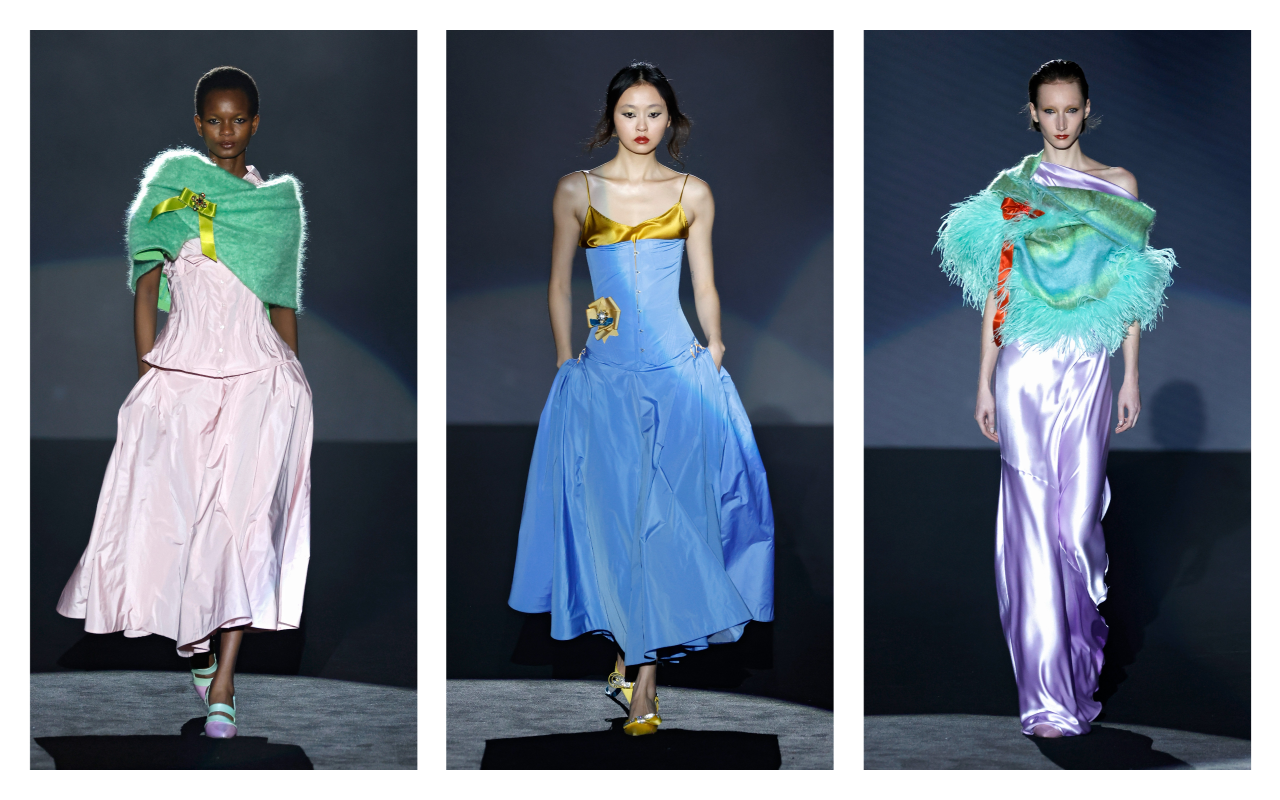 Menchen Tomas. Mercedes-Benz Fashion Week Madrid. Fall/Winter 2025/2026 Collection
Menchen Tomas. Mercedes-Benz Fashion Week Madrid. Fall/Winter 2025/2026 Collection
Menchen Tomas
BLITZ by Menchén Tomás is a collection that travels to the heart of 1980s London to revive the creative and rebellious spirit of the legendary Blitz Club. Epicenter of the underground scene and cradle of the aesthetic and musical avant-garde of the time, this legendary club inspired a proposal that celebrates freedom of expression and stylistic audacity, reinterpreted from a contemporary perspective.
For autumn-winter 2025/26, the firm led by Olga Menchén proposes pieces that invite us to play with fashion as a creative and personal act. Delicate silks, structured crepe, triacetate and chantilly make up a selection of fabrics that offer movement, texture and a feeling of tactile luxury. The colour palette evolves from the sobriety of black and white to metallic shades, eucalyptus green, porcelain blue and pale pink, evoking emotions that complement the dynamism of the garments. The silhouettes explore volumes and structures that dialogue with the aesthetic experimentation of the Blitz Club. The designs dare to decontextualise traditional garments and materials, proposing tunics, oversized blouses, straight-cut trousers and dresses that play with layers and transparencies. Each look is an invitation to break free from established norms and embrace fashion as a form of self-expression.
Beyond aesthetics, BLITZ raises a reflection on sustainability and the importance of giving materials a second life. The firm champions local craftsmanship and the value of work done in Spain, guaranteeing meticulous control of each phase of production and reaffirming its commitment to quality and environmental responsibility.
This collection, presented on the catwalk at Mercedes-Benz Fashion Week Madrid, is an ode to creative daring and free identity, where each garment seeks to inspire and empower those who wear it. For Menchén Tomás, dressing is much more than covering up: it is daring to imagine and express who we are.
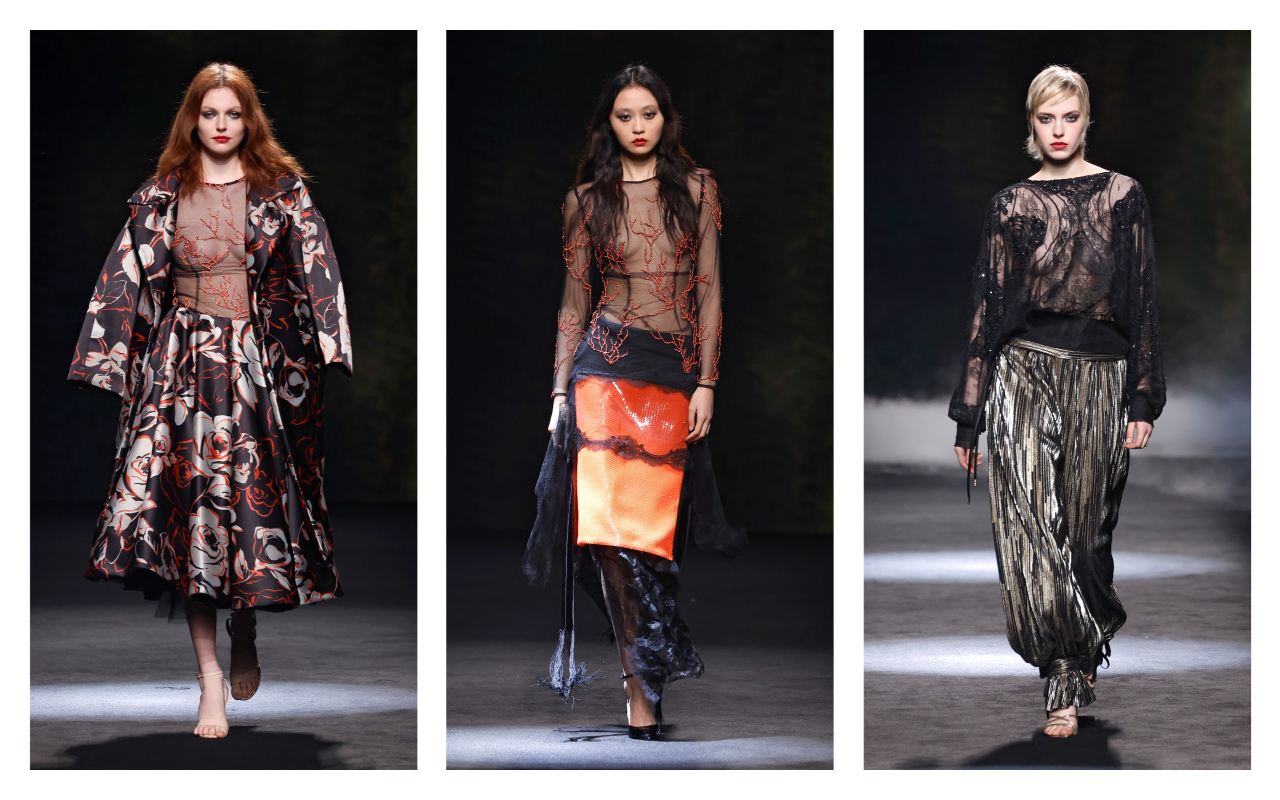 Yolancris. Mercedes-Benz Fashion Week Madrid. Fall/Winter 2025/2026 Collection
Yolancris. Mercedes-Benz Fashion Week Madrid. Fall/Winter 2025/2026 Collection
Yolancris
YOLANCRIS, the Barcelona-based label founded by sisters Yolanda and Cristina Pérez, has presented its autumn-winter 2025/26 collection under the YC ready-to-wear line: a contemporary reinterpretation of the extravagance and art de vivre of the Marchioness Luisa Casati. Inspired by this iconic figure of the 20th century, the proposal pays homage to the empowered woman who turned her life into a work of art, challenging the established norms of her time.
The collection is based on three creative pillars: Catalan Modernism, the irreverent freedom of the 1970s and the artistic heritage of Mariano Fortuny. The result is a series of pieces that explore the duality between opulence and functionality, maintaining the artisanal essence that has defined the house since 2005. Wrap-around tunics and coats are combined with 70s-style trousers and maxi blouses, while straight dresses incorporate art deco details that provide sophistication without excess.
In terms of materials, Yolancris deploys a textile universe that emphasizes quality and texture. Leather and lace — the latter worked using the soleil pleating technique — coexist with rich velvets and silk gauzes that provide lightness and movement. Artisanal embroidery and hand-made ornamental details underline the firm’s commitment to excellence in tailoring and local savoir-faire. This combination of heavy and ethereal fabrics creates a visual contrast that, at the same time, reinforces the collection’s versatility.
The colour palette ranges from dark, neutral tones—such as intense blacks and deep grays—to more vibrant accents that evoke the free spirit of the 1970s. Yolancris ‘ proposal not only seeks to dress, but also to empower: each garment is a declaration of freedom, designed for the contemporary woman who values comfort without giving up elegance.
This first foray of the YC ready-to-wear line into Mercedes-Benz Fashion Week Madrid represents an important step for the brand, reaffirming its commitment to local production and sustainability. Yolancris demonstrates that everyday fashion can be a vehicle for self-expression and authenticity, fusing tradition and modernity with a sophisticated and contemporary approach.
The first major retrospective of Gianni Versace arrives in Spain

Fotografía: Paula Caballero
If there is a designer who understood fashion as a spectacle, it was Gianni Versace. He did not limit himself to creating clothes; he built his own universe, where excess was synonymous with elegance and pop culture was mixed with classical mythology. Now, his essence re-emerges in Gianni Versace Retrospective , an exhibition never seen before in Spain organized by Fundación Unicaja that lands in Malaga with more than 500 original pieces to take a tour through the mind of the Italian genius.
The exhibition is housed in the historic building of the Episcopal Palace and, across nine thematic sections, invites us to explore its inspirations, from Classical Greece to the vibrant Miami Beach scene in the 90s. Between shiny fabrics, baroque prints – such as the iconic Barocco – and looks that defined the era of the Supermodels, this exhibition reminds us that the Versace legacy is more alive than ever.
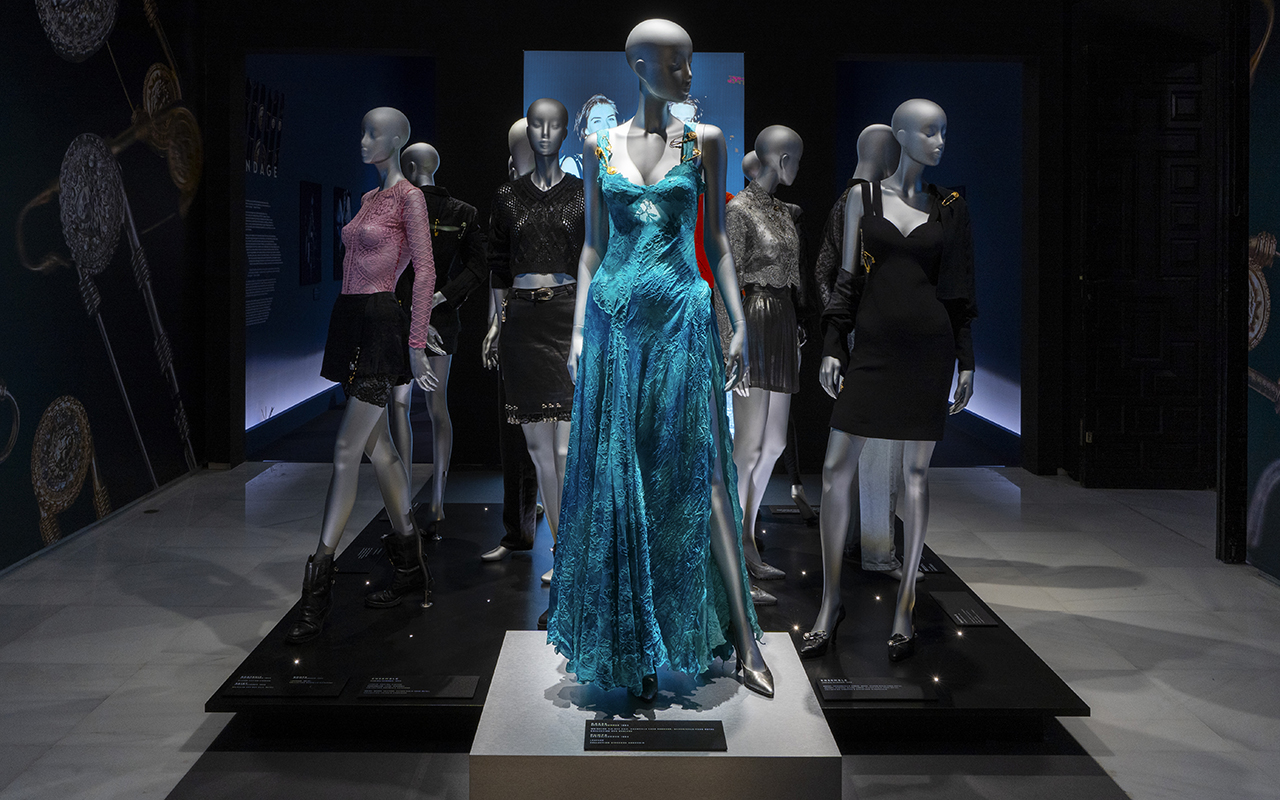
Fotografía: Paula Caballero
The designer who made fashion a spectacle
Gianni Versace didn’t just revolutionize fashion, he redefined it. In the 80s and 90s, his shows were events where supermodels walked like modern goddesses and the clothes screamed power and sensuality. His creations also dressed stars like Madonna, Prince and Elton John, cementing him as the designer of icons.
His ability to mix cultural references from different eras and geographies turned his designs into wearable pieces of art. From Greco-Roman classicism to punk aesthetics, Versace absorbed everything that inspired him and transformed it into something unique. His approach to fashion was instinctive and deeply visual: he was not afraid of colour, exuberant patterns or bold silhouettes. His brand became synonymous with daring luxury and boundless glamour.
The exhibition is unprecedented in Spain and captures that spirit, from his beginnings in Calabria, his arrival in Milan and his fascination with art and architecture to his last collection in 1997, before he was murdered. Through his most iconic looks, original sketches and previously unpublished photographs, Gianni Versace Retrospective immerses us in his creative process.
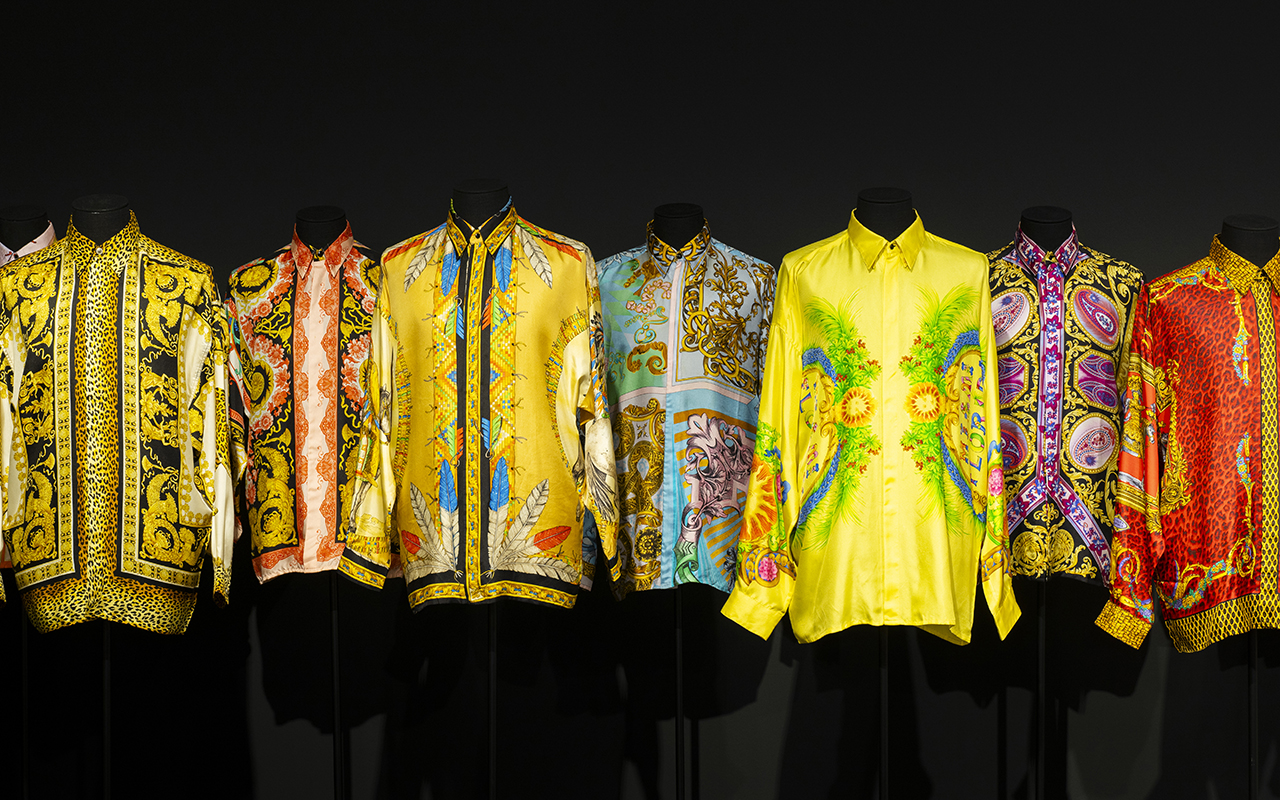
Fotografía: Paula Caballero
The keys to understanding the soul of Gianni Versace
The exhibition is structured into nine spaces that capture some of the key aspects of Gianni Versace’s imagination, evident in all of his designs.
Inspiration from Greco-Roman mythology : Versace’s fascination with classical antiquity is reflected in his recurrent use of mythological iconography. The Medusa, which became the brand’s emblem, symbolised irresistible attraction and power. His collections incorporated motifs of Ionic columns, golden friezes and depictions of gods, fusing the opulence of imperial Rome with a modern vision of luxury.
Baroque splendour : No one like Versace at mixing gold, classical motifs and excess without losing sophistication. Inspired by art, the Christian religion and Italian architecture, his use of ornamentation and rich fabrics made him a master of maximalist luxury. Despite this, the exhibition also reveals his minimalist side towards the mid-90s. An interesting exercise in stylistic contrasts.
The magic of South Beach : Miami was his refuge and his muse. The Art Deco aesthetic, classic cars and multicultural energy of the city were reflected in his 90s collections. The light, colours and vitality of the city influenced the vibrant prints and marine motifs that characterised some of his most memorable collections.
Art and pop culture : Inspired by Warhol and the repetition of images, Gianni Versace created unforgettable prints. Versace understood before anyone else that fashion should dialogue with popular culture, and his collaborations with artists marked a turning point in the relationship between fashion and art.
Supermodels of the 90s : The Italian couturier elevated Cindy, Naomi, Claudia and Linda to the status of goddesses. He not only designed for them, but helped shape the modern concept of the “supermodel” by turning his shows into media extravaganzas. His 1991 show, where top models walked to George Michael’s Freedom , is an iconic fashion moment.
The power of provocation : She redefined rebellion with leather, studs and harnesses. Her reinterpretation of punk and fetish aesthetics proved that fashion could play with boundaries without losing its sophistication. The iconic Bondage collection of 1992 turned traditionally provocative elements into haute couture pieces that challenged established norms.
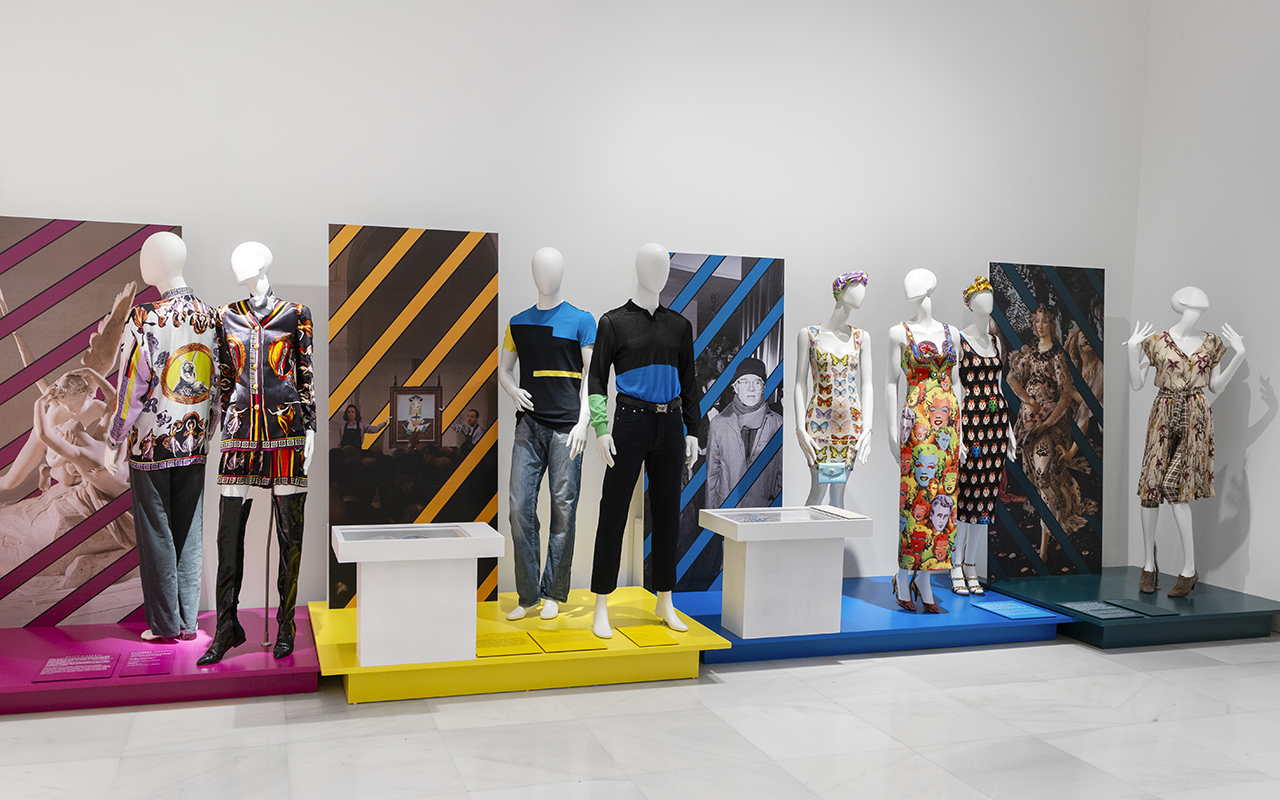
Fotografía: Paula Caballero
Fashion, culture and myths of the 90’s
Beyond the catwalk, Gianni Versace’s impact on popular culture was immense. His vision was cinematic, his shows were carefully orchestrated productions, and his approach to fashion broke with many of the conventions of the time. He pioneered a strong visual identity for his brand, integrating architectural elements, instantly recognizable prints, and a use of color that defied the trends of minimalism.
Versace also understood the power of image and marketing in fashion. He was one of the first designers to forge ties with the entertainment industry, dressing artists and creating moments that transcended the catwalk. Lady Diana, Madonna, Cher, Elizabeth Hurley… they all became ambassadors of his bold and sophisticated aesthetic.
Versace also made his mark in cinema and theatre, designing costumes for operas and films. His passion for dramatization and theatricality was reflected not only in his fashion, but in the way he presented his work to the world.
The legacy of a visionary
More than 25 years after his death, Versace’s impact is still felt. His influence can be seen on catwalks, red carpets and even in urban culture. The brand he founded, now under the direction of his sister Donatella, continues to reinterpret his aesthetic, keeping the DNA of the house alive.
The 1990s fashion revival has brought back into the spotlight many of the elements that Versace popularised: the tight-fitting clothes, the baroque prints, the fusion of luxury and rebellion. Contemporary designers continue to find inspiration in his work, and his name remains synonymous with audacity and opulence.
This exhibition is not just a tribute, it is an invitation to relive the art of a designer who turned fashion into a statement of intent. To immerse oneself in his universe is to understand how fashion can be much more than clothing: it is identity, it is art and it is history.
The Gianni Versace Retrospective exhibition will be open to the public until the 30th June at the Unicaja Foundation Cultural Center in Malaga.
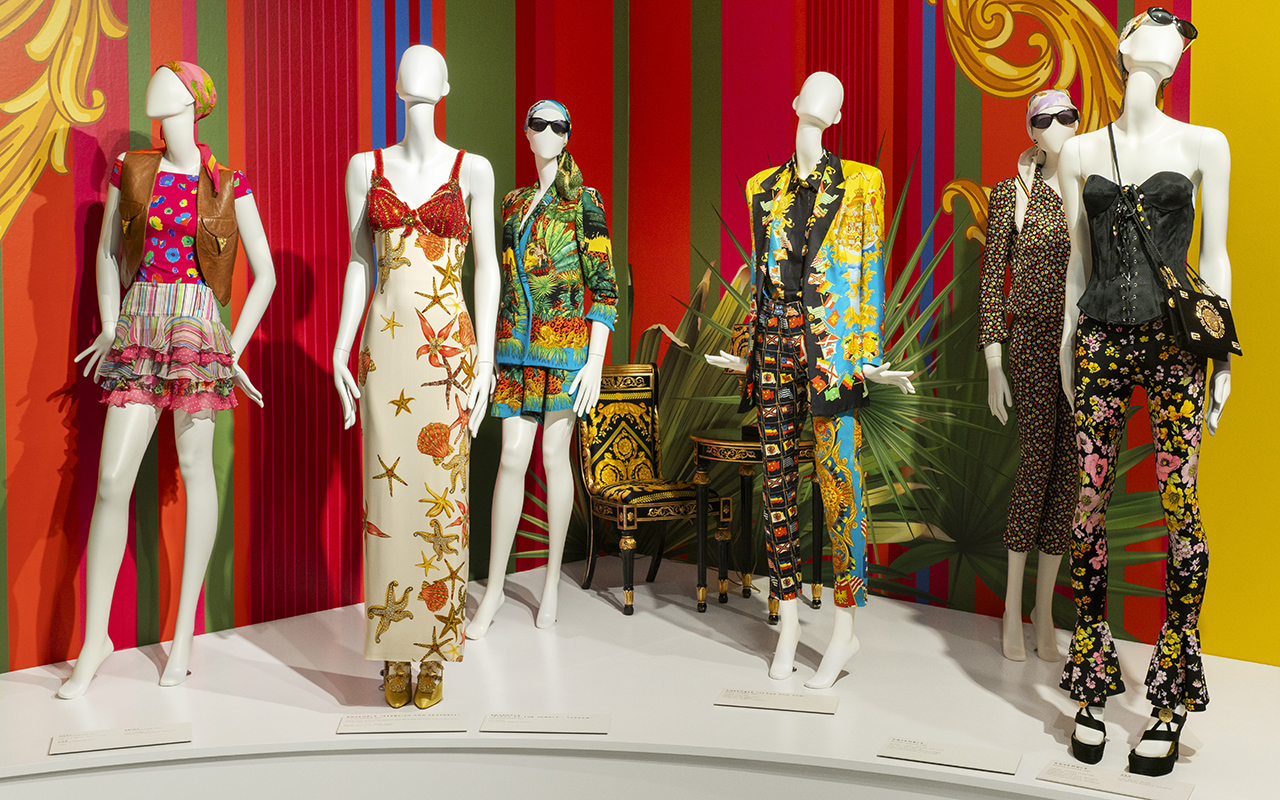
Fotografía: Paula Caballero
(Español) 2025, ¿qué hay de nuevo?
Mocha Mousse, the colour of the year 2025, according to Pantone
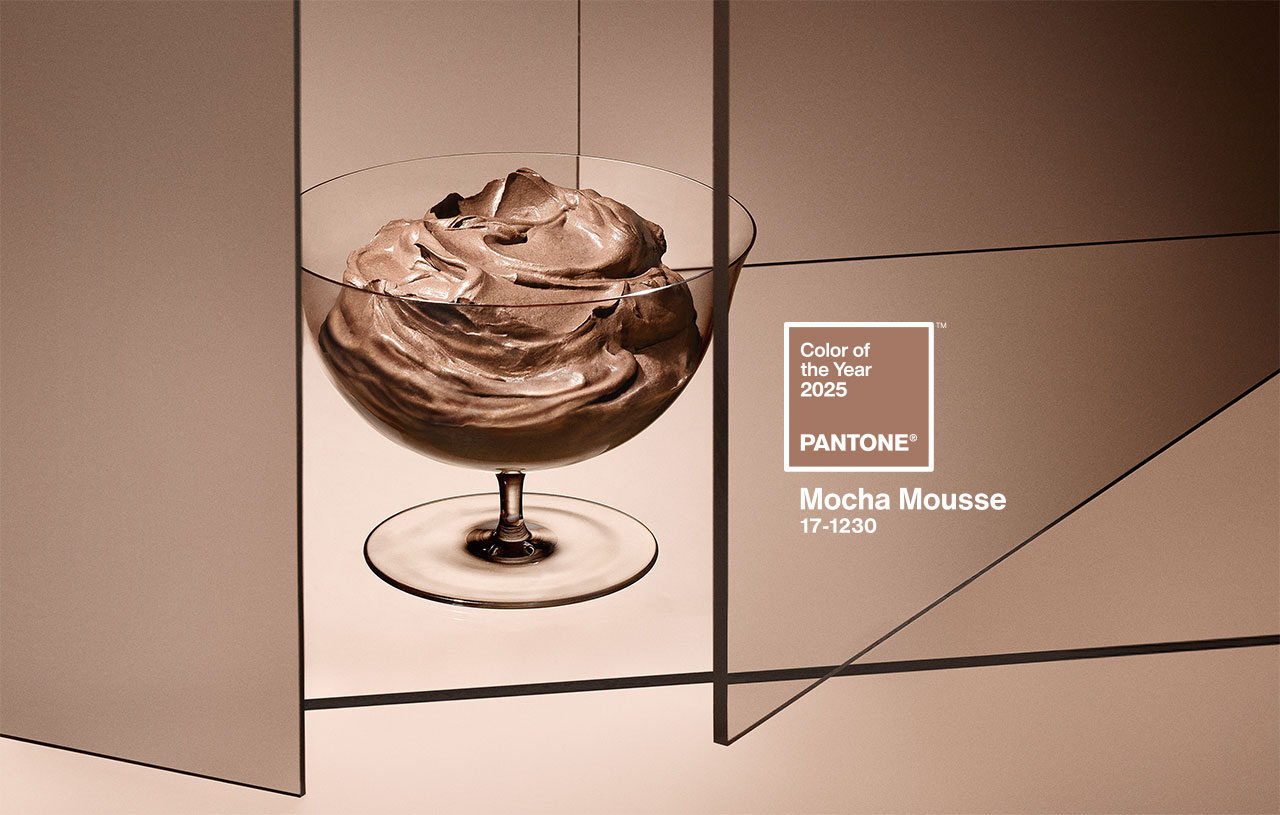 Mocha Mousse. Pic by Pantone
Mocha Mousse. Pic by Pantone
Imagine a creamy dessert that combines the aromas of cocoa, chocolate and coffee, with evocative textures and an intense brown tone that awakens both the sight and the palate. This suggestive image, which mixes everyday life and small pleasures, connects directly with the colour of the year 2025 chosen by Pantone: 17-1230 Mocha Mousse. This shade, described by the company as “a soft and evocative brown, but also intense and warm”, invites our senses to enjoy pleasure and exquisiteness.
A colour that opens the appetite
Mocha Mousse, suggestive and inspiring, takes over from Peach Fuzz 13-1023, the delicate peach shade that was the colour of the year 2024. “Inspired by our desire for everyday pleasures, 17-1230 Mocha Mousse expresses a level of thoughtful pleasure,” explains Leatrice Eiseman, executive director of the Pantone Colour Institute, as said in the new release announcing the long-awaited reveal. “Sophisticated and exuberant, yet an unpretentious classic, this colour expands our perception of browns as humble, understated tones to embrace aspiration and luxury. Infused with subtle elegance and earthy refinement, it presents a touch of understated, tasteful glamour,” says Eiseman.
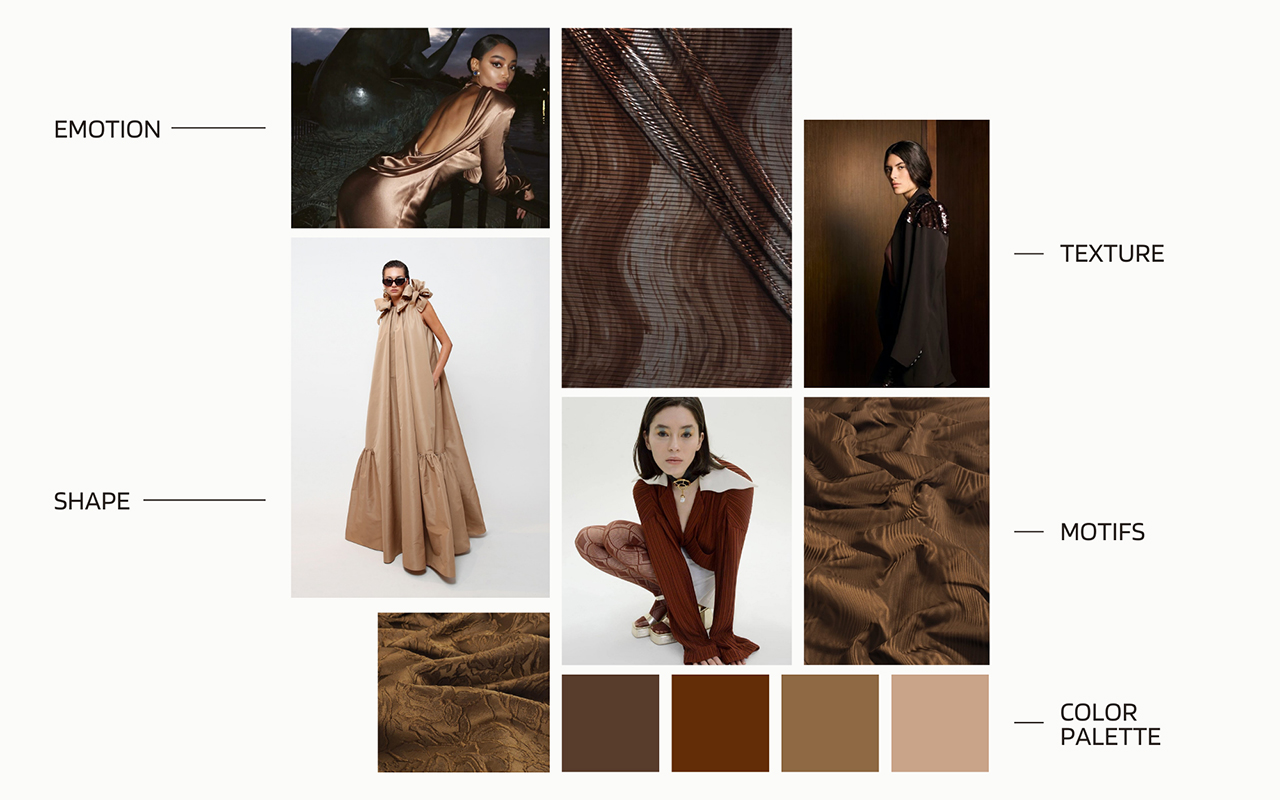
Connecting with the origins
Although some on social media have criticised the choice of brown, associating it with the current period of instability and lack of authenticity, Pantone defends its decision by highlighting the growing search for connection with nature and the origins of humanity. “Characterised by its organic nature, 17-1230 Mocha Mousse honours and celebrates the sustenance offered by our physical environment. Infused with authenticity, it strikes a balance between the demands of modernity and the timeless beauty of artistic creation,” the company explains.
Laurie Pressman, vice president of the Pantone Colour Institute, describes Mocha Mousse as an extension of Peach Fuzz that came before it, sharing its essence of comfort but taking it a step further by including “the simple pleasures we can give away and share with others,” like a glass of mocha mousse. “The eternal quest for harmony permeates every aspect of our lives: our relationships, the work we do, our social connections, and the natural environment around us. This colour brings us contentment, inspiring a positive state of inner peace, calm, and balance, while attuning us to the world around us. Harmony encompasses both a culture of connection and unity and the synthesis of our mental, spiritual, and physical well-being,” Pressman details, highlighting how this shade reflects that longing for connection and balance.
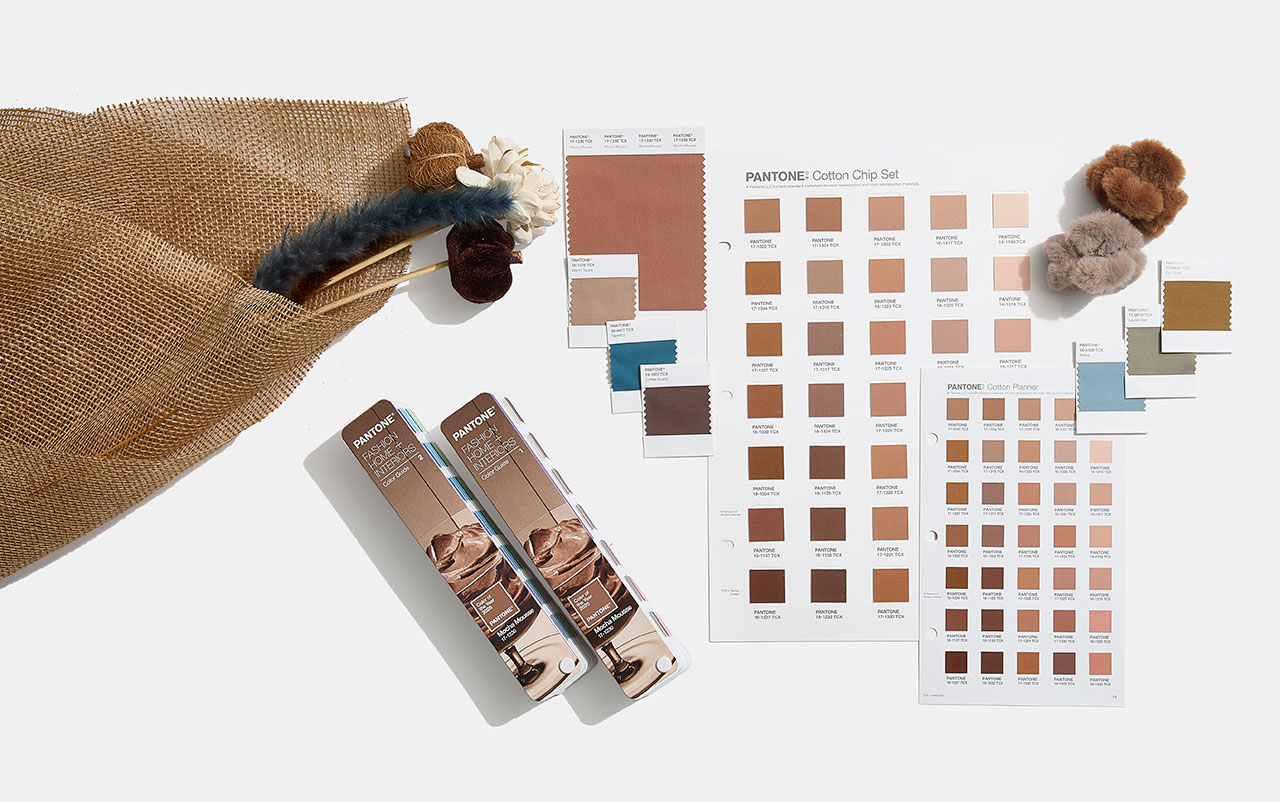
How is the colour of the year created?
Pantone, the global authority on colour and a set of professional standards for the design community, began defining the colour of the year in 1999. The first choice was the iconic cerulean blue (Pantone 15-4020), a shade that achieved worldwide fame thanks to the film The Devil Wears Prada, released seven years later. In this film, Meryl Streep, as the feared Vogue editor, immortalised the colour with an unforgettable fashion speech to Anne Hathaway: “What you don’t know is that that sweater isn’t just blue. It’s not turquoise, and it’s not navy. It’s actually cerulean.”
The initial goal of this initiative was to generate conversation around colour, involving both the design community and colour enthusiasts. But choosing the colour of the year is not a simple or arbitrary process. Behind this decision there is a rigorous analysis. Each year, a committee of colour experts studies cultural, artistic and social trends worldwide to identify significant references. Based on this analysis, they select an existing colour from the Pantone catalog and name it with an easy-to-remember name.
Over the years, these choices have reflected the global socio-economic context: from Marsala, which evoked the world of wine in 2015, to the double choice of 2021 – Illuminating yellow and Ultimate Grey – which symbolised the challenges of the pandemic. In 2022, Very Peri, a bold lavender shade, connected the real world with the digital one. Beyond their beauty, these colours invite a reflection on the times we live in.
In 2010, Pantone expanded its reach beyond the design niche to connect with the general public, adapting to new creative disciplines inspired by colour. This is when two key initiatives emerged: the Pantone Colour Institute and the Colour of the World. the Year. These proposals not only investigate and promote the use of colour, but have also transformed the brand’s marketing strategy, turning it into a global trend. Today, the colour of the year directly influences product development and purchasing decisions in sectors such as fashion, decoration, design and advertising.
The Pantone guide, which began with 500 colours for the graphic arts, now has more than 2,000 references. Every 18 months, new and more precise shades are added, reflecting the evolution of colour in our daily lives. Today, Pantone is a multinational with a strong global presence. Since its acquisition by X-Rite, a company specialising in colour management, the company has grown exponentially. With 17 offices around the world, Pantone markets everything from its famous guides to branded products and strategic alliances. Recent examples include collaborations with Motorola for smartphones, special editions of Jägermeister bottles , and even coffee capsules in partnership with Nespresso, a partnership that raises the question: have these capsules inspired this year’s colour choice?
In 2025, to celebrate the 26th anniversary of the Pantone Colour of the Year, the company has taken the colour beyond its guides, highlighting it at global events and experiences. From New York and London to Shanghai and Mumbai, Pantone has curated public spaces and gatherings to make the colour of the year accessible to everyone.
The gentle elegance of Mocha Mousse: applications in fashion and design
In the fashion world, Mocha Mousse is positioned as a highly versatile neutral shade. Dubbed “the colour of unpretentious elegance,” this shade stands out for its ability to create warm, minimalist looks that blend with different skin tones, creating a chromatic camouflage effect. The colour of the year 2025 also redefines our perception of brown, taking it from humble and earthy to luxurious and aspirational.
Translating this to the textile world, Mocha Mousse offers endless possibilities. Its sensorial warmth is reflected in fabrics with a delicate touch such as cashmere, angora, soft velvet and furry textures that envelop and comfort. It also shines in lighter materials such as airy chiffons, fluid satins or knits that provide movement and draped elegance. This shade, imbued with earthy refinement, embodies an organic and authentic luxury, promoting minimalist looks that opt for simplicity without artifice.
Mocha Mousse also adapts to various textures and finishes. From matte surfaces that highlight its naturalness to shiny or metallic finishes that give it a sophisticated touch, this colour works as a perfect base for bold colour combinations or monochromatic looks full of depth.
In decoration and interior design, Pantone 17-1230 Mocha Mousse connects with our desire for well-being and comfort. This earthy and refined brown brings a feeling of warm home, whether on floors, painted walls or decorative elements. Its presence stands out in natural materials such as wood, stone, rattan, wicker or leather, offering a balance between sophistication and homely warmth.
At Gratacós, we have selected some key fabrics that connect this colour of the year with our new collection. From luxurious textures to versatile finishes, you will find inspiration to bring Mocha Mousse to your fashion and design projects.
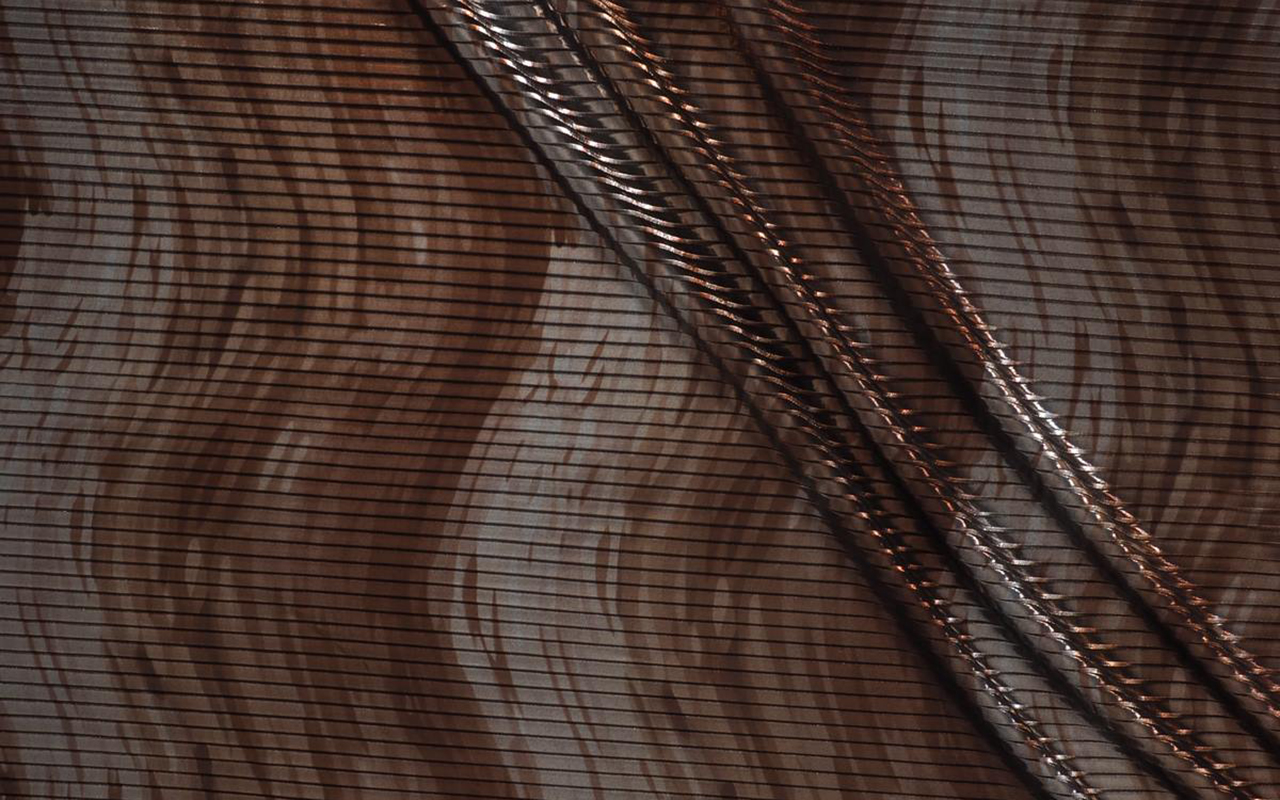

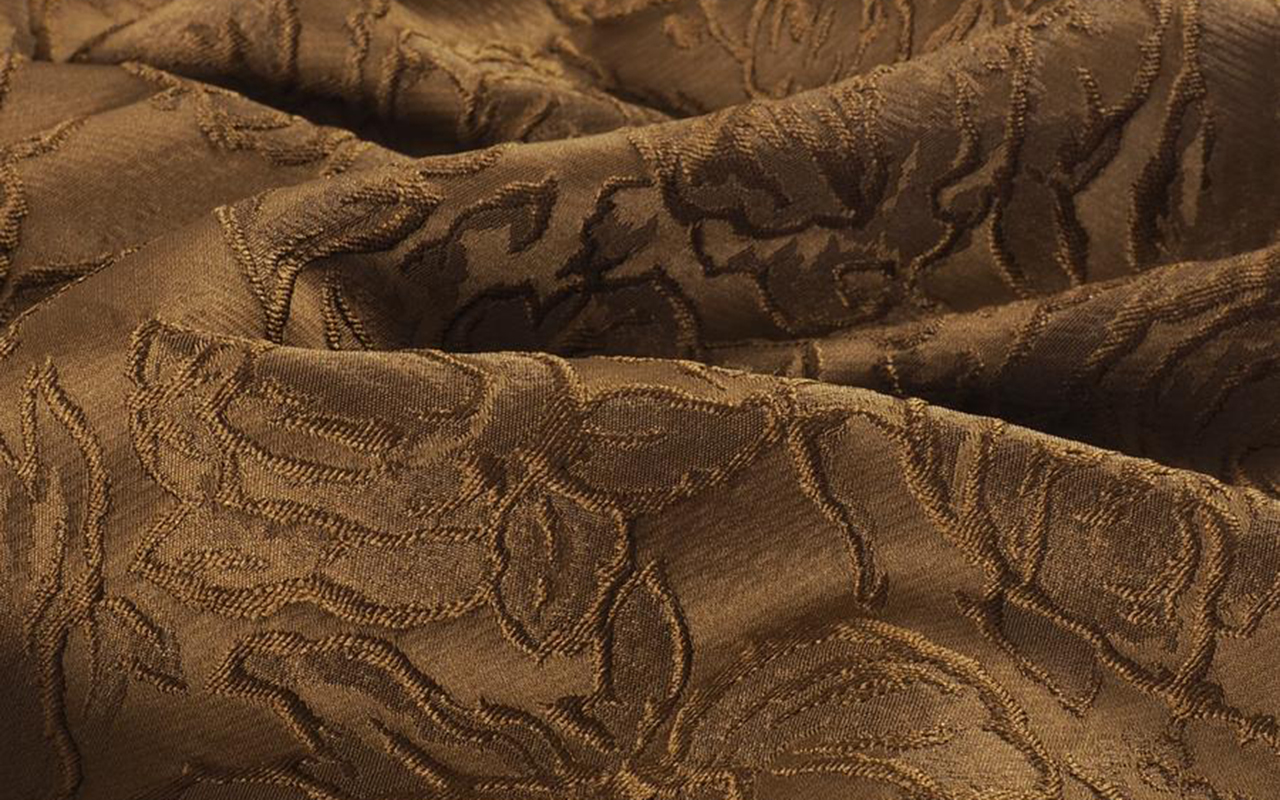
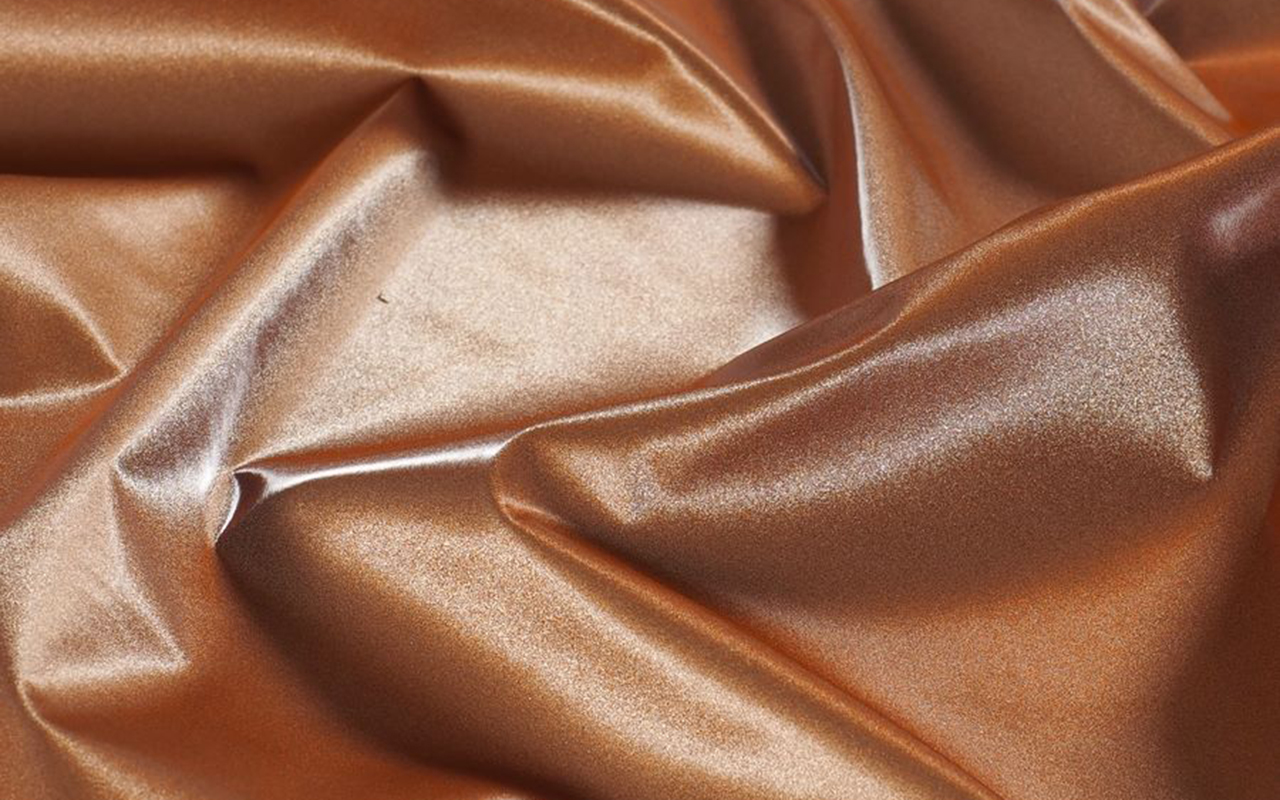
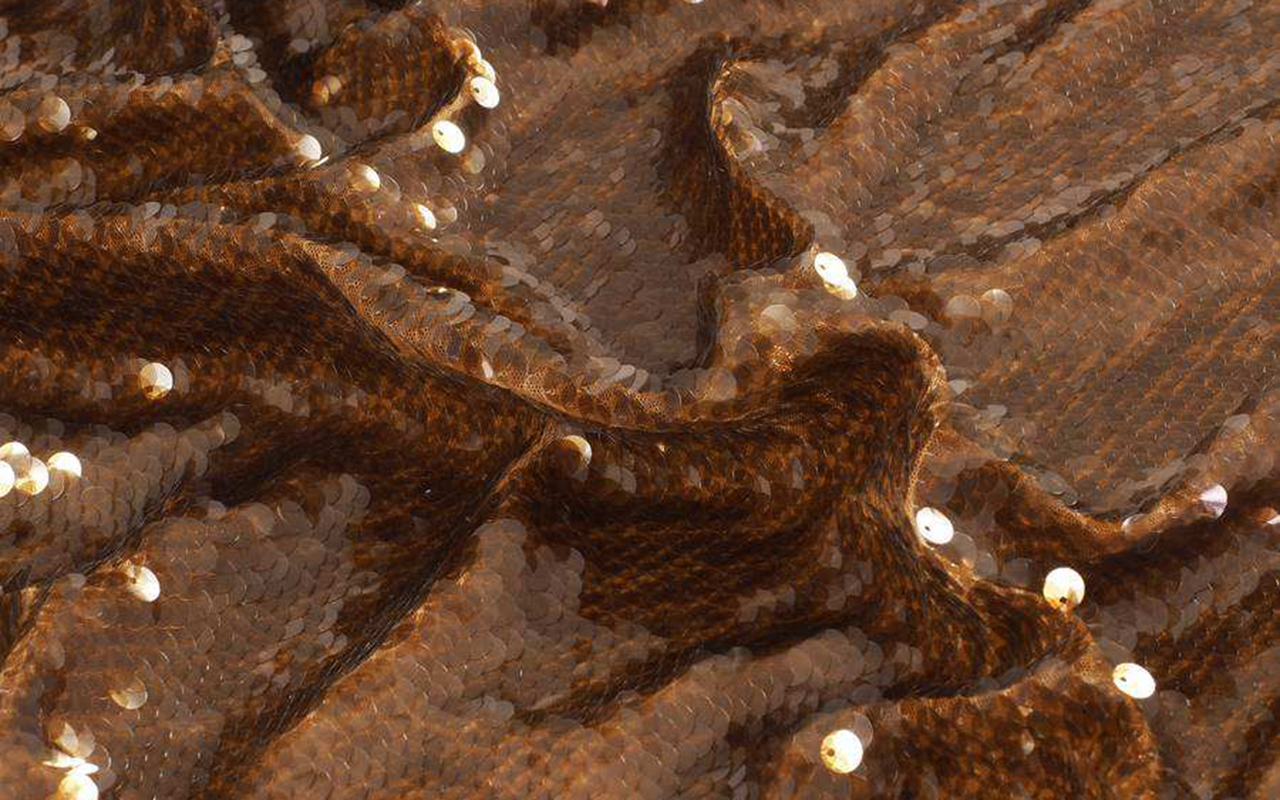
Irving Penn’s legacy lands in A Coruña
 Irving Penn.Centennial by Fundación MOP
Irving Penn.Centennial by Fundación MOP
He was an icon of fashion photography and his revolutionary vision can now be remembered in Spain. The Marta Ortega Pérez Foundation (MOP Foundation) takes a further step in creating bridges between photography and fashion with the exhibition Irving Penn: Centennial. This is the largest retrospective dedicated to the talented American photographer ever presented in Spain. A symbolic exhibition that covers the 70 years of his prolific career, which has already been shown in New York, Paris and Berlin.
Irving Penn: Centennial is an exhibition organized by The Metropolitan Museum of Art in New York, in collaboration with the Irving Penn Foundation and curated by Jeff L. Rosenheim , Joyce Frank Menschel Curator in Charge of Photography at The Met . The exhibition can be visited free of charge until the 1st May 2025 at the MOP Foundation exhibition centre, located in the port area of A Coruña.
A journey into the soul of Irving Penn’s photography
Created in 2017 to mark the centenary of the artist’s birth, Irving Penn: Centennial is a tribute to his prolific career in all its breadth, from his beginnings in the late 1930s to the early years of the 21st century. What is most interesting about the exhibition is that it allows us to delve deeper into the photographer’s work beyond his best-known projects. This is precisely the aim of the exhibition: to cover all facets of Penn’s work, including fashion photography, delicate female nudes, floral compositions and still lifes, the still lifes of everyday objects that he was fond of throughout his life.
The exhibition also highlights the portraits of personalities who made him famous, such as his muse Lisa Fonssagrives, Pablo Picasso and Marlene Dietrich, as well as his photographic series documenting ordinary people captured in different corners of the world. It also includes unique pieces such as the backdrop of his studio and unpublished works that allow the visitor to delve into his creative process. Altogether, the exhibition brings together more than 160 works that offer a complete overview of the career of an artist who revolutionised the visual language of the 20th century.
 Irving Penn.Centennial by Fundación MOP
Irving Penn.Centennial by Fundación MOP
A democratic look
The exhibition is the perfect excuse to decipher Irving Penn’s legacy and understand his role in fashion photography, a field that transcended to create a unique visual universe. His motto, “less is more”, remains a reference for artists and creatives, reminding us that beauty can be found in the essential and the simple.
Vogue magazine redefined visual standards through a style that combined simplicity with sophistication. His images, characterized by a minimalist use of space and neutral backgrounds, transformed the perception of commercial and fine art photography. With an avant-garde approach, Penn turned the everyday into art, immortalizing everything from iconic figures such as Audrey Hepburn and Miles Davis to objects as common as cigarette butts.
The exhibition also highlights his technical mastery: Penn revived techniques such as platinum-palladium printing and experimented with materials to achieve a unique quality in his photographs. Each image reveals his ability to capture the essence of his subjects, transcending documentation and creating pieces charged with emotion and symbolism.
Supplementary materials
To enrich the experience, the MOP Foundation has exclusively published a catalogue in Spanish of the exhibition, a must for admirers of Penn’s work and 20th-century photography. This volume brings together almost 300 images, including iconic and previously unpublished works, accompanied by essays that explore the main themes of his career.
In addition, as every year, visitors will be able to enjoy a new set designed specifically for the exhibition, both inside the warehouse and in the outer space. The venue has also reopened its bookstore, specialising in photography, fashion, design and other artistic disciplines.
A legacy that endures
Irving Penn: Centennial exhibition becomes the fourth major retrospective promoted by the MOP Foundation, reaffirming its commitment to photography, fashion and its connection with A Coruña. Since its creation, the Foundation has promoted highly relevant exhibitions, such as Peter Lindbergh. Untold Stories (2021-22), Steven Meisel 1993: A Year in Photographs (2022-23) and Helmut Newton: Fact & Fiction (2023-24).
Photos by:
Irving Penn. Picture of self, Cuzco, 1948© The Irving Penn Foundation
Irving Penn. Marlene Dietrich, New York, 1948 © The Irving Penn Foundation
Irving Penn. Woman in Chicken Hat (Lisa Fonssagrives-Penn), New York, 1949 © The Irving Penn Foundation
Irving Penn. Naomi Sims in Scarf, New York, ca. 1969 © The Irving Penn Foundation




The luminous fabrics you need to shine during the holidays
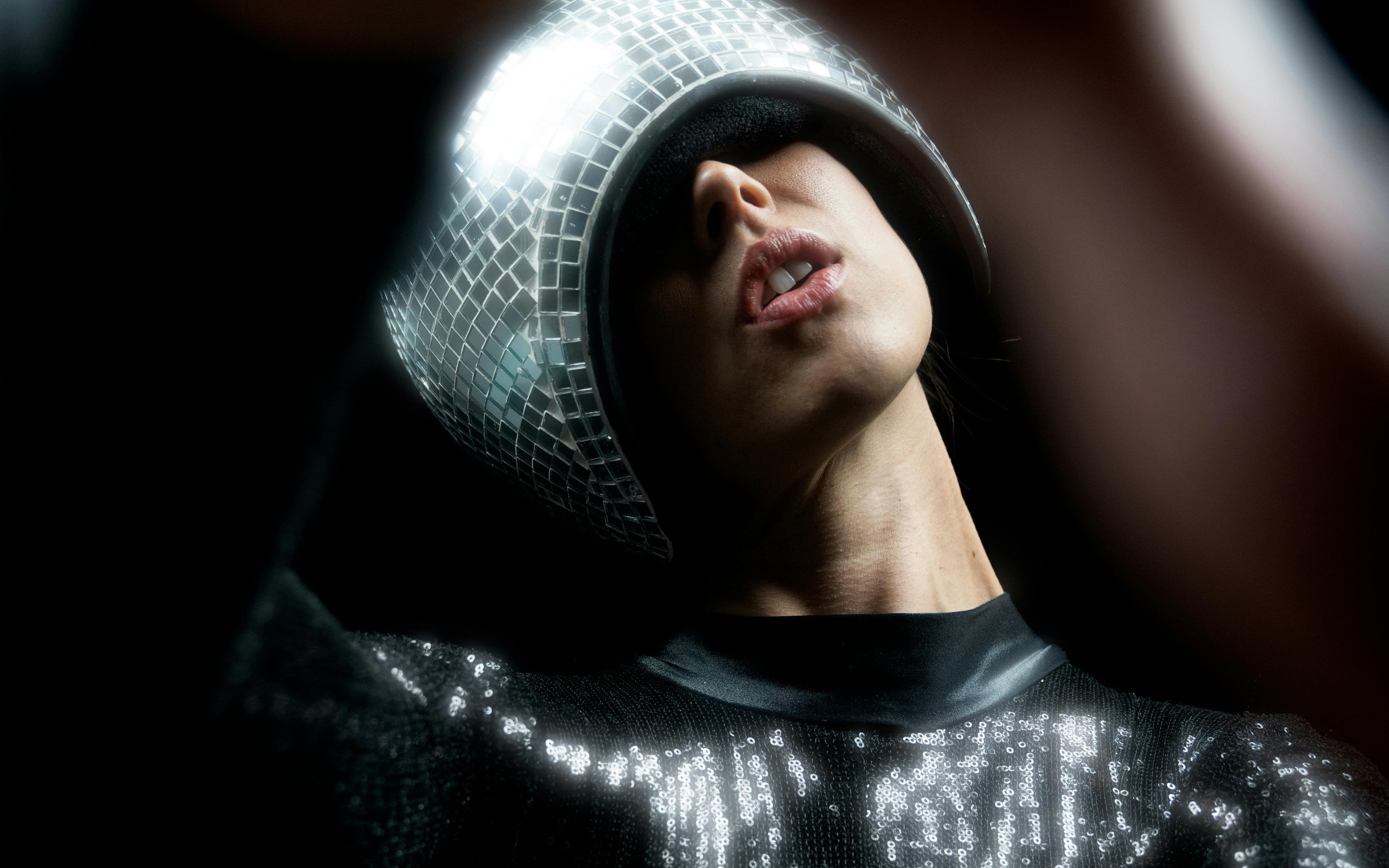
The Christmas season is here, and with it comes the first flashes of lights in the streets, company dinners, intimate gatherings with friends and family, and big celebrations that invite us to show off our best clothes. It’s the perfect time to stand out with special garments that stand out for their elegance and sophistication.
At Gratacós, we understand this need and, therefore, each collection includes carefully designed fabrics, made with the premium quality that special occasions demand. In this new blog entry, we want to guide you through our star fabrics so that you shine during the holidays, whether in a subtle way or with a dazzling touch. Discover their characteristics and learn how to make the most of each one for your most special moments. We will tell you about it below!
Velvet
Few fabrics inspire as much fascination as velvet. Its soft texture, with a short pile surface that changes direction when brushed, and its ability to delicately reflect light make it an irresistible classic for the holiday season. Plus, its slight elasticity makes it perfect for creating elegant and comfortable garments that stand out at any event.
Velvet evokes instant luxury and is incredibly versatile, especially for evening looks. From long evening gowns to full suits with fitted blazers and palazzo pants, this fabric adds a touch of sophistication to every look. The best part? At Gratacós we offer you a wide range of shades so you can find the one that best suits your style and the occasion.
Discover all the possibilities of velvet here.
Silk
Since ancient times, silk has been a symbol of luxury and sophistication. This natural fabric is distinguished by its extreme softness, natural shine and fluid drape, making it the perfect choice for garments that seek to elegantly adapt to the body. Silk has an impeccable drape, ideal for dresses and blouses that, without losing their shape, envelop with unique delicacy.
For the Christmas festivities, nothing beats a long silk dress with a lingerie style in metallic tones or deep red, ideal for a New Year’s party. If you prefer a more groundbreaking style, a silk blouse combined with high-waisted trousers creates a sophisticated and modern look. Another must-have? A long silk skirt, combined with a knitted or cashmere sweater, for an outfit that perfectly balances femininity and comfort.
Discover our silk fabrics here.
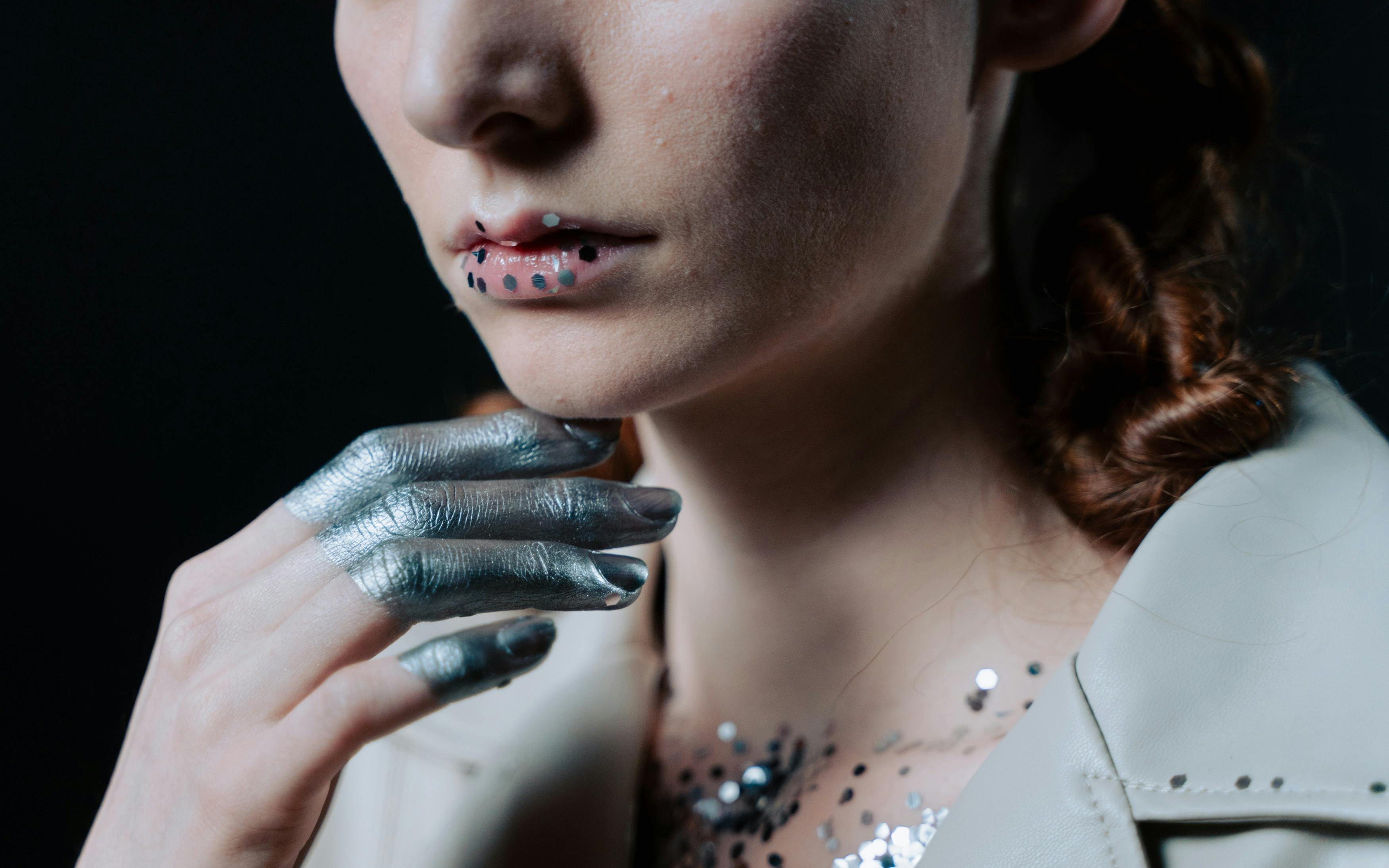
Brocade
Ornate and full of character, brocade evokes baroque splendour with its homage to excess and intricate floral or geometric patterns woven in metallic threads. With its coarse texture and imposing presence, this fabric is perfect for creating structured garments that stand out on any special occasion.
What possibilities does it offer? A brocade dress is the perfect choice for very formal events, but this fabric can also be adapted to a more contemporary style. For example, a brocade jacket combined with high-waisted jeans creates a modern and sophisticated look with an unexpected twist. In addition, brocade is ideal for striking layers such as coats, jackets or blazers that add a regal air to any outfit.
Opt for a brocade garment for Christmas Eve dinners or events where you want to convey elegance and a subtle touch of royalty.
Jacquard knitting suggestions that you will fall in love with here.
Sequins
If there is a fabric that captures the essence of the festive season, it is sequins. This timeless classic reflects light in a spectacular way, becoming the centre of attention. But at Gratacós we go one step further: this season, sequins are reinvented with maxi versions and combinations of 2 or 3 colours that create irresistible and unique mosaics.
Do you already know how to combine them? If not, here are some ideas: go for a head-to-toe shiny dress to dazzle at any event or dare to try less conventional options, such as jackets with metallic embellishments or even accessories such as bags. And if you are looking for an infallible look, a midi sequin dress in gold or silver tones is perfect to stand out on New Year’s Eve with elegance and glamour.
Discover our most original sequins here.
Taffeta
When we think of glamorous pieces with volume and structure, taffeta is the undisputed star. This lightweight yet firm fabric stands out for its rigidity, which allows it to hold its shape, and its subtle sheen, making it a classic choice for ball gowns and evening wear.
Design ideas? Taffeta is ideal for dresses with full skirts or layered details that need structure. Bright hues like silver or emerald further enhance its elegance, making it the perfect choice for high-end events like Christmas galas or New Year’s Eve dinners in luxurious settings.
Discover our seasonal taffetas here.
And if you’re looking for something even more special, explore our premium collection with fabrics designed for unforgettable occasions. Plus, our surprise boxes with four fabrics from past collections will inspire you to create unique and magical looks for this holiday season.
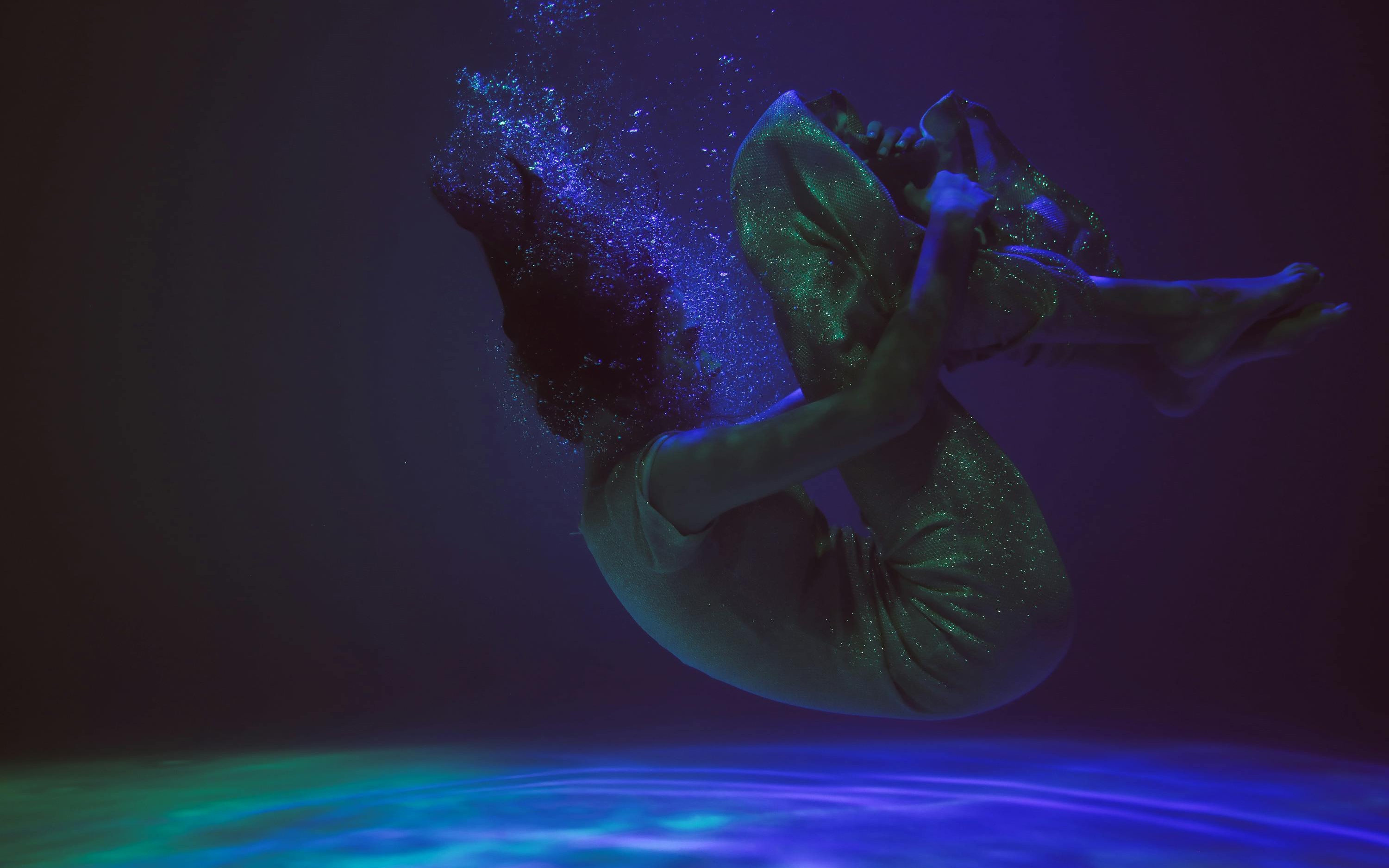




(Español) Miró y Matisse, una admiración mutua en imágenes
Garnet, burgundy or cherry red, call it what you want, this is the colour of autumn 2024
 Collage: 1. Rodarte, 2. Gonçalo Peixoto, 3. Mariano Moreno, 4. ON RUSH, 5. Joplin Atelier, 6. Acuamona. Courtesy of the brands
Collage: 1. Rodarte, 2. Gonçalo Peixoto, 3. Mariano Moreno, 4. ON RUSH, 5. Joplin Atelier, 6. Acuamona. Courtesy of the brands
Maroon, scarlet, burgundy, wine, cherry… There are many ways to refer to the range of dark reds with a blue or violet touch. This range of possibilities encompasses a captivating colour, synonymous with luxury, power and status, which seduces with its warmth and has fascinated both designers and artists throughout the centuries. This autumn 2024, it is once again taking centre stage on the catwalks, reaffirming its place as an elegant, versatile and personality-filled colour. Some call it “the new neutral”, but why does this dark shade of red have such a timeless, almost bewitching appeal? We will explore its history, psychology and the reason for its triumphant return in this season’s collections.
Origin of Colour. On Wine, Clothing and Theatricality
The garnet or burgundy colour Marsala is named after the famous red wines from the Burgundy region of France, known for their refinement. This connection makes it a colour associated with wealth, luxury and sophistication. In 2015, Pantone elevated this association – between fashion and wine – by crowning Marsala as the hue that would guide industrial design, fashion, beauty, furniture and interior decoration. For that year, the international colour authority imagined a world tinged with “a warm, yet elegant hue that is universally attractive and easily transposed into multidisciplinary arts”. Pantone considered Marsala to be equally attractive to men and women, capable of moving and awakening the sense of taste, as well as inciting creativity and experimentation with colour.
If we look back in history, the use of burgundy in textiles and clothing goes back much further than its contemporary name. Since ancient times, dark red dyes were prized for their rarity and the status they conferred on those who could afford to wear them. During the Middle Ages and Renaissance, burgundy dyes were extremely expensive due to the rare ingredients needed to produce them, such as the Tyrian purple snail or madder root. Consequently, this colour was reserved for aristocracy and royalty, who wore garments in dark reddish tones to symbolise power and authority. At the court of Henry VIII, for example, burgundy was a shade frequently used by high nobility, such as Mary Tudor, who wore an iconic burgundy velvet dress at her wedding to Louis XII of France in 1514. Another historical reference is found in the burgundy velvet and satin dresses worn by European royal women in the 18th century, such as Marie Antoinette, whose taste for rich, deep colours set a trend in court fashion.
In modern times, burgundy remains associated with theatricality and drama. Consider the shade of a theatre curtain and drapery. In cinema, this vibrant shade has been immortalised in films such as Gone with the Wind, where Scarlett O’Hara wears a majestic dress in this shade, designed to convey both power and sensuality. The colour has also been a key element in contemporary films such as Moulin Rouge, where it is used to enhance the drama and passion of the characters.
Why is it back in fashion this Autumn 2024? From the catwalk to the streets
Burgundy combines the passion of red with the depth of brown, evoking luxury, ambition and power. It is a versatile shade that suits different skin tones: on light skin, it highlights its luminosity; on dark skin, it provides sophistication without being strident. Its intensity varies depending on the material it is used on, acquiring a visual texture that can be modern and minimalist in fabrics such as satin, or luxurious and opulent in velvet.
Garnet is the star of the autumn-winter collections, both in monochrome looks and in daring combinations. From sixties trench coats combined with platform loafers and structured bags, as proposed by Sabato De Sarno for Gucci, to tailored suits in the collections of Roksanda and Ferragamo . In a more casual version, Lacoste opts for jumpsuits combined with oversized coats, creating a mix between comfort and style.
This shade also lights up autumn evenings, where fitted leather microdresses stand out in the collections of Thierry Mugler and Ermanno Scervino. Other proposals include bow tops and pleated trousers in the collection of Philosophy di Lorenzo Serafini, providing a second skin in burgundy that redefines discreet luxury. In addition, burgundy is combined with neutral tones, such as beige or midnight blue, in proposals by Victoria Beckham and Khaite, or with bolder colours such as fuchsia, in a bold bet championed by Pierre Cardin.
And in fabrics… What do we recommend?
At Gratacós, we fall in love with burgundy, a classic that never goes out of style. This shade is enhanced in luxurious fabrics that allow you to play with texture and movement. To get the most out of it, we recommend these materials:
1. Silks and satins: Ideal for elegant garments with a fluid drape that enhances the sensuality of the garnet.
2. Wool cloths: Perfect for coats and outerwear, transmitting warmth and sophistication in winter looks.
3. Velvet: Provides depth and a luxurious air that turns any garment into a special piece.
4. Lace and tulle: For romantic and feminine looks, ideal for evening events or more delicate garments.
Check out our seasonal collection in our online store and discover the fabrics that best suit your style. Don’t miss the opportunity to be captivated by this timeless colour!




